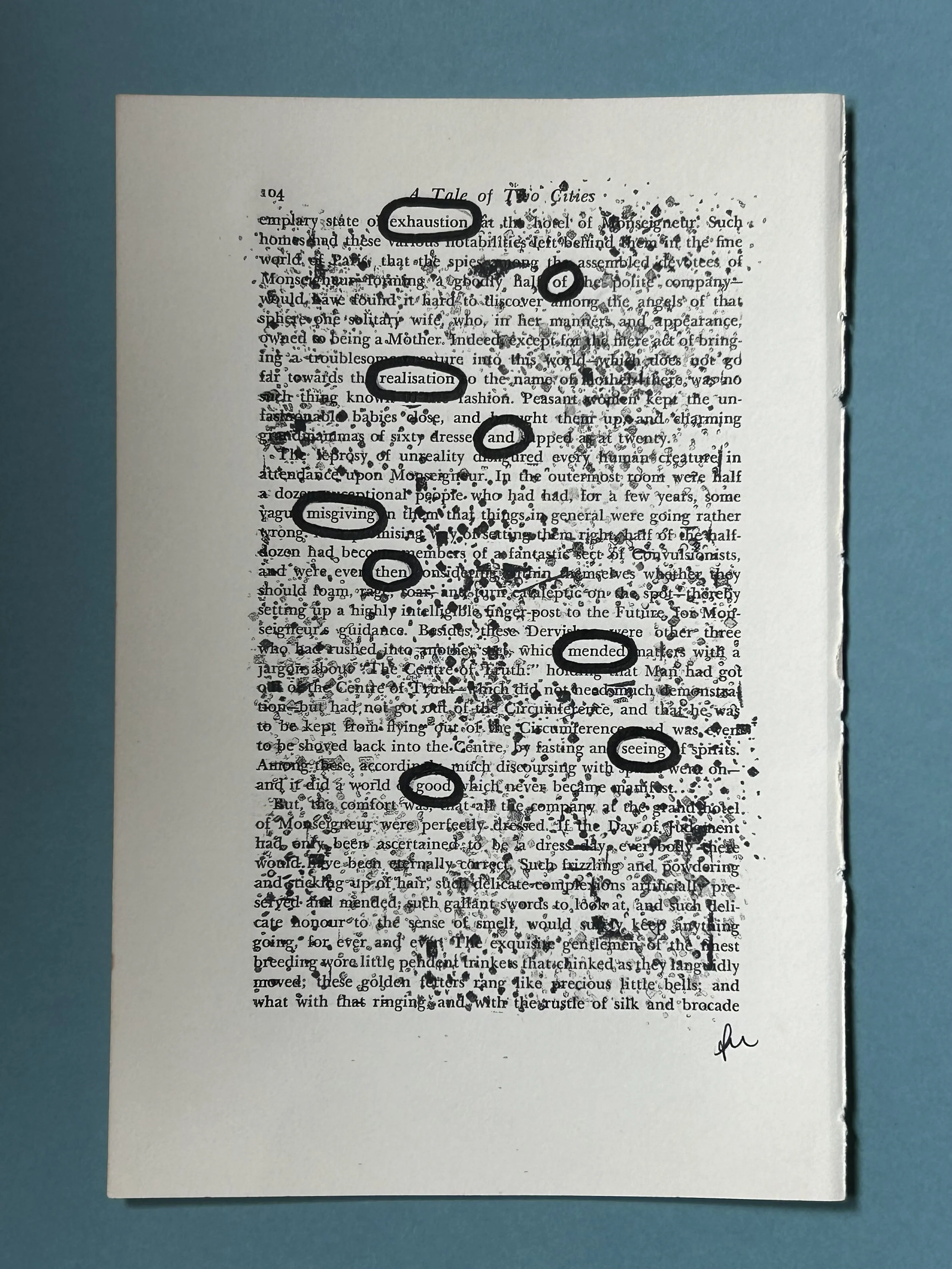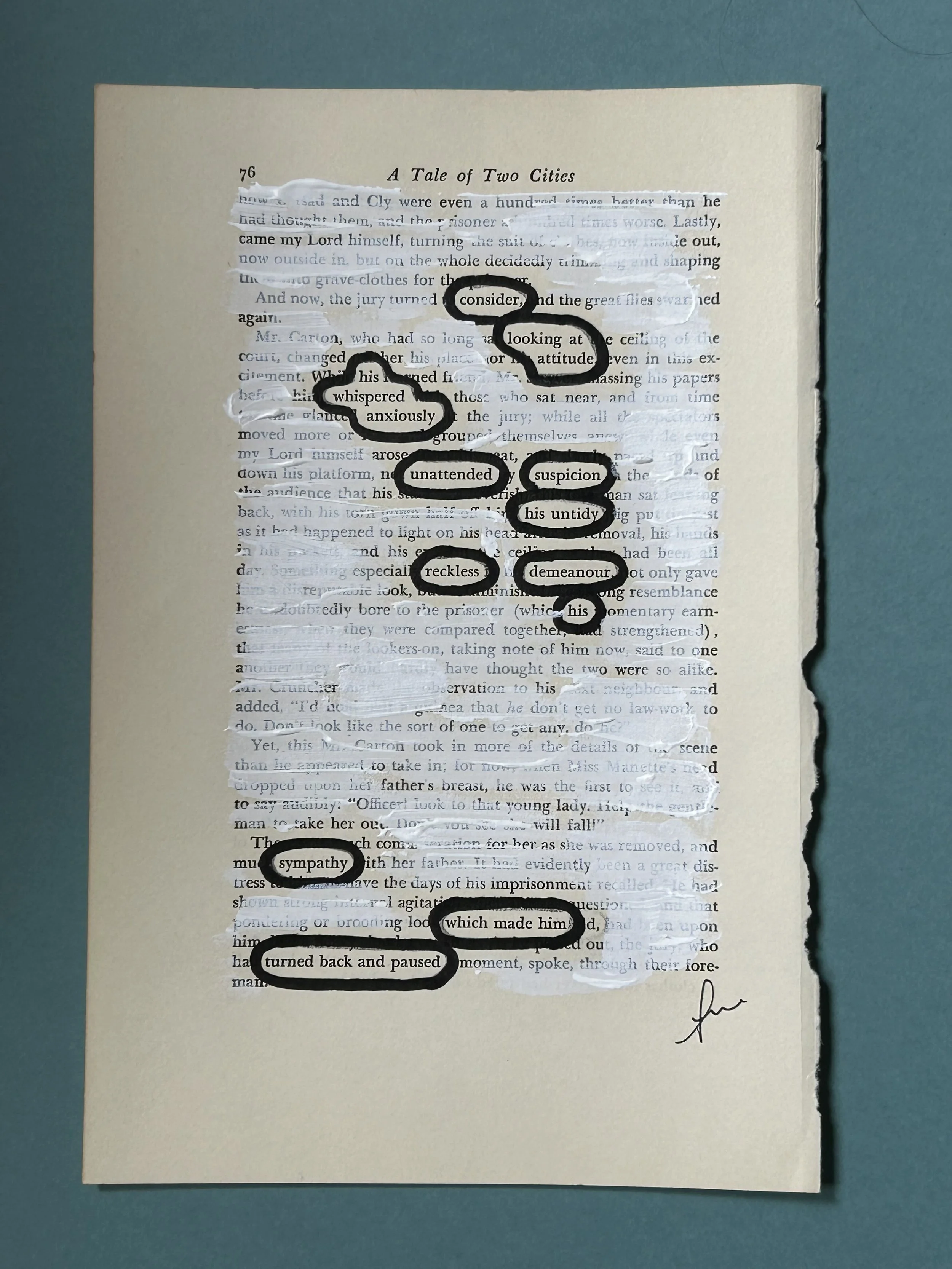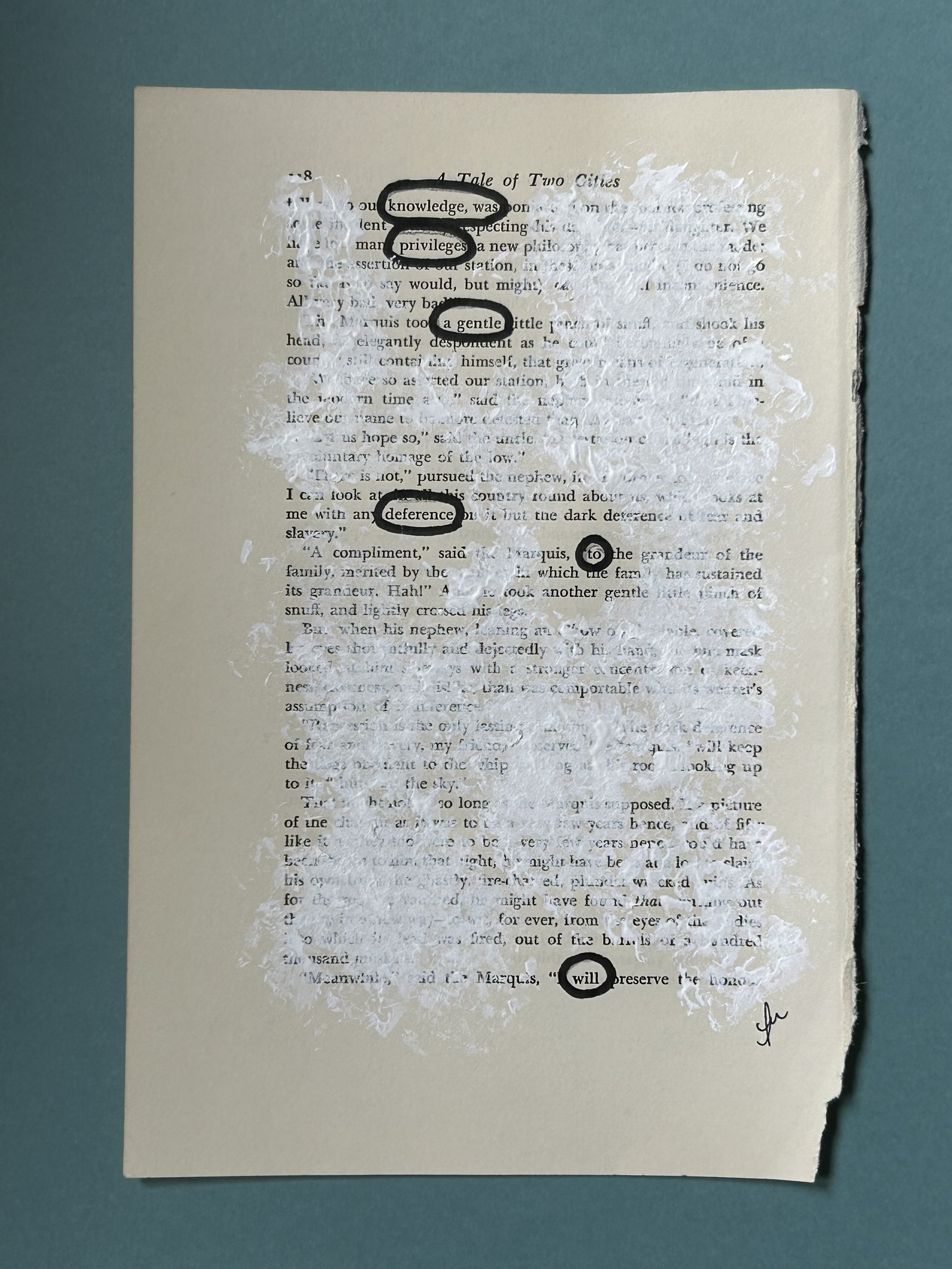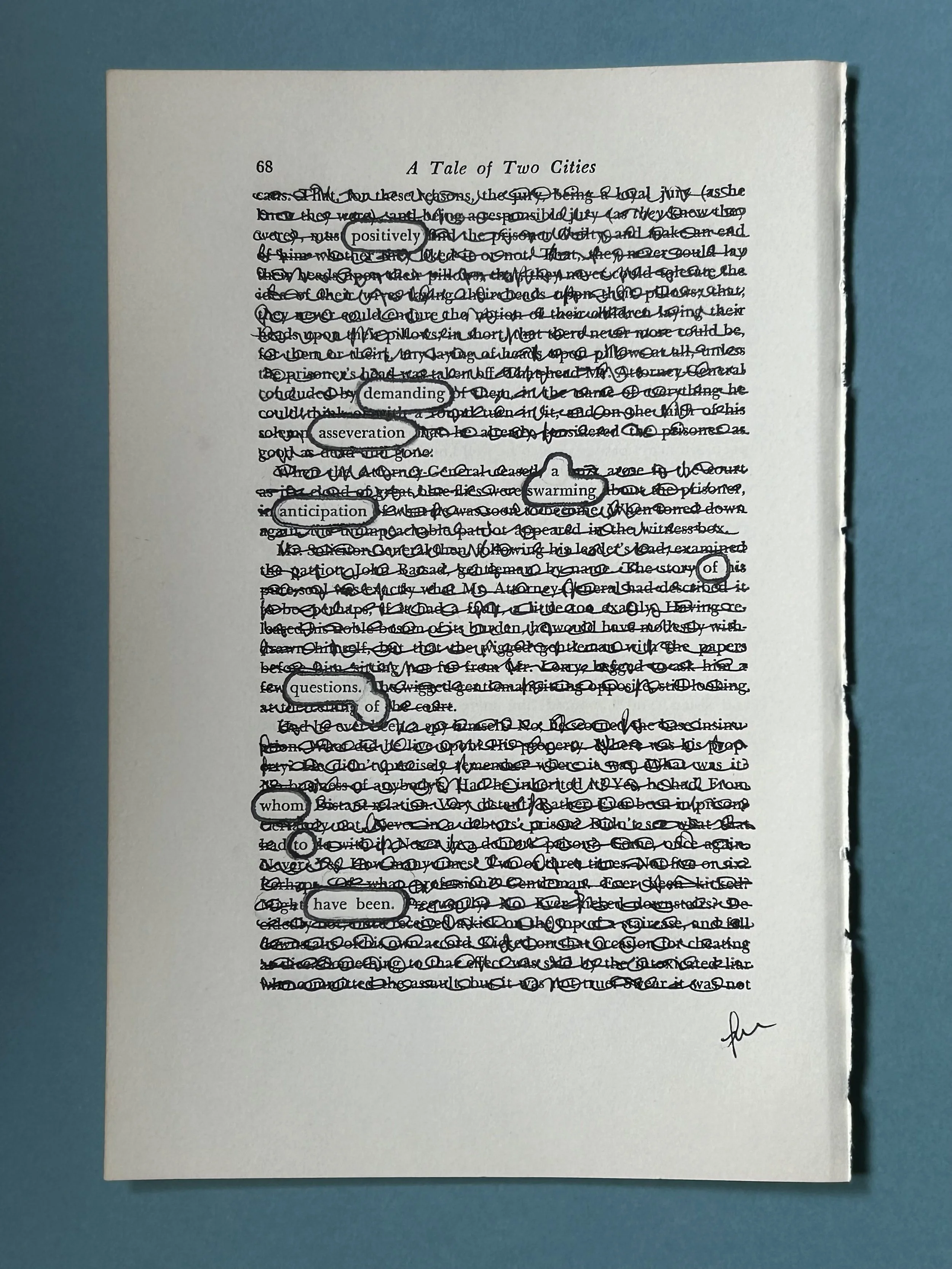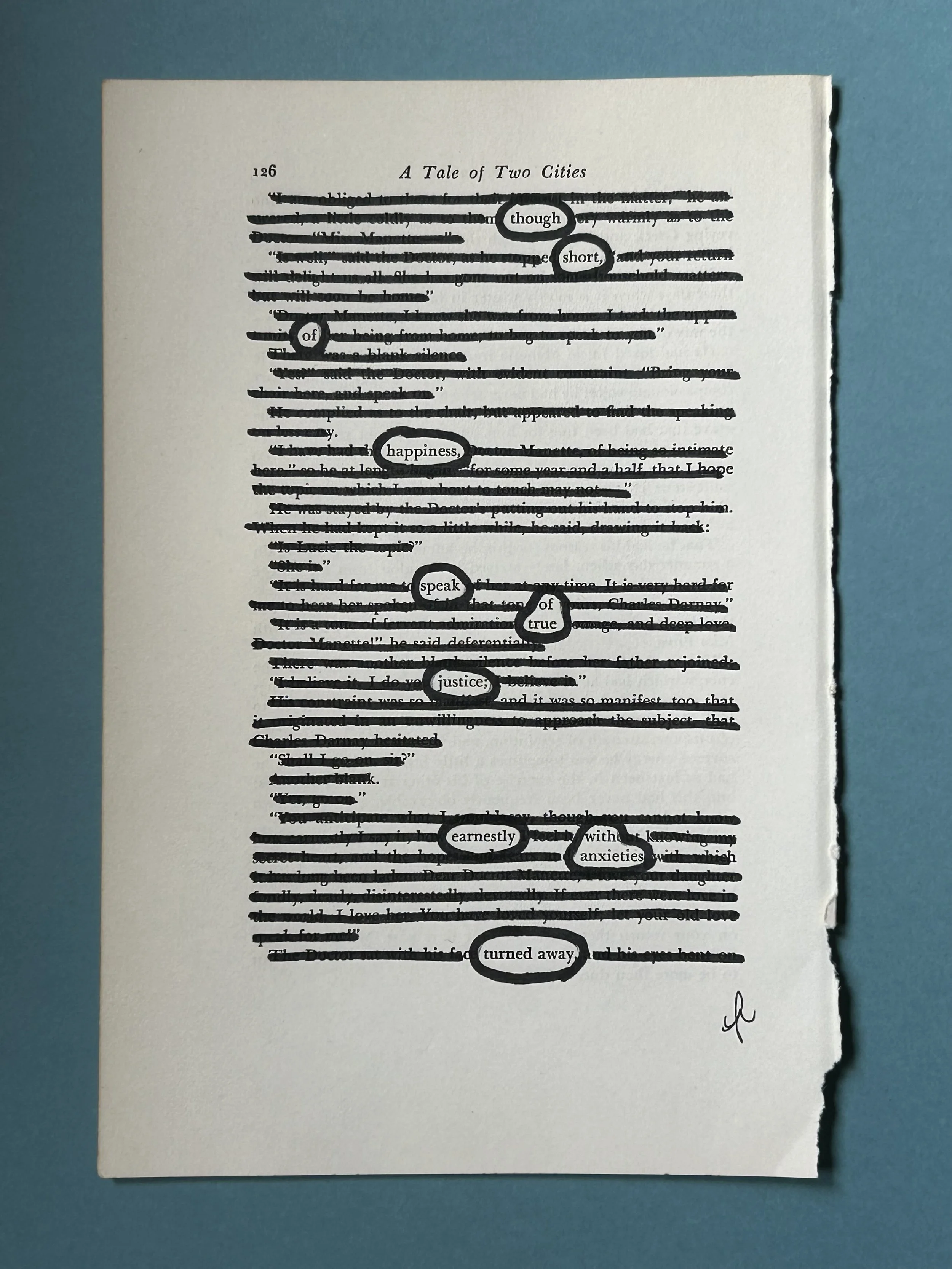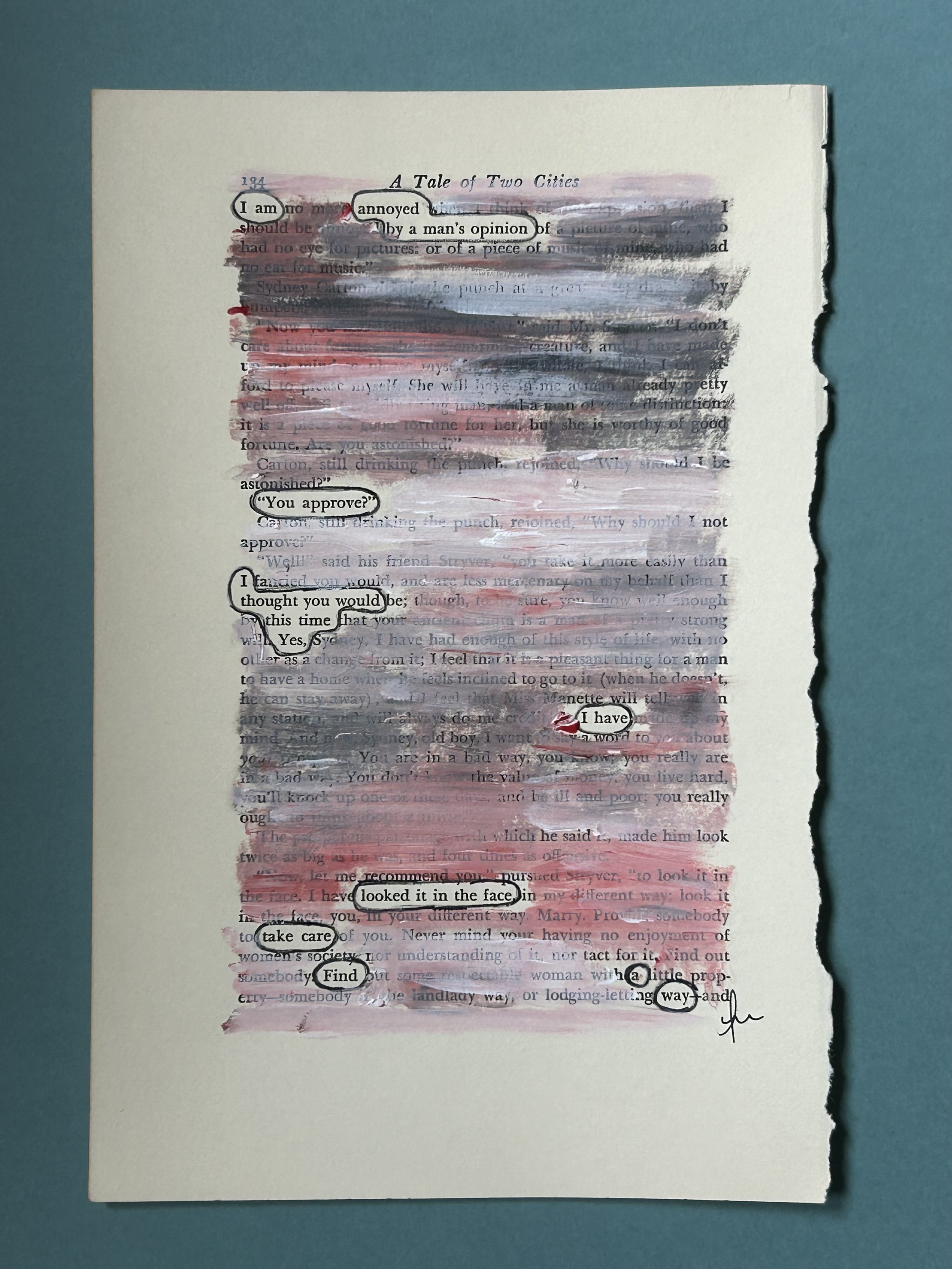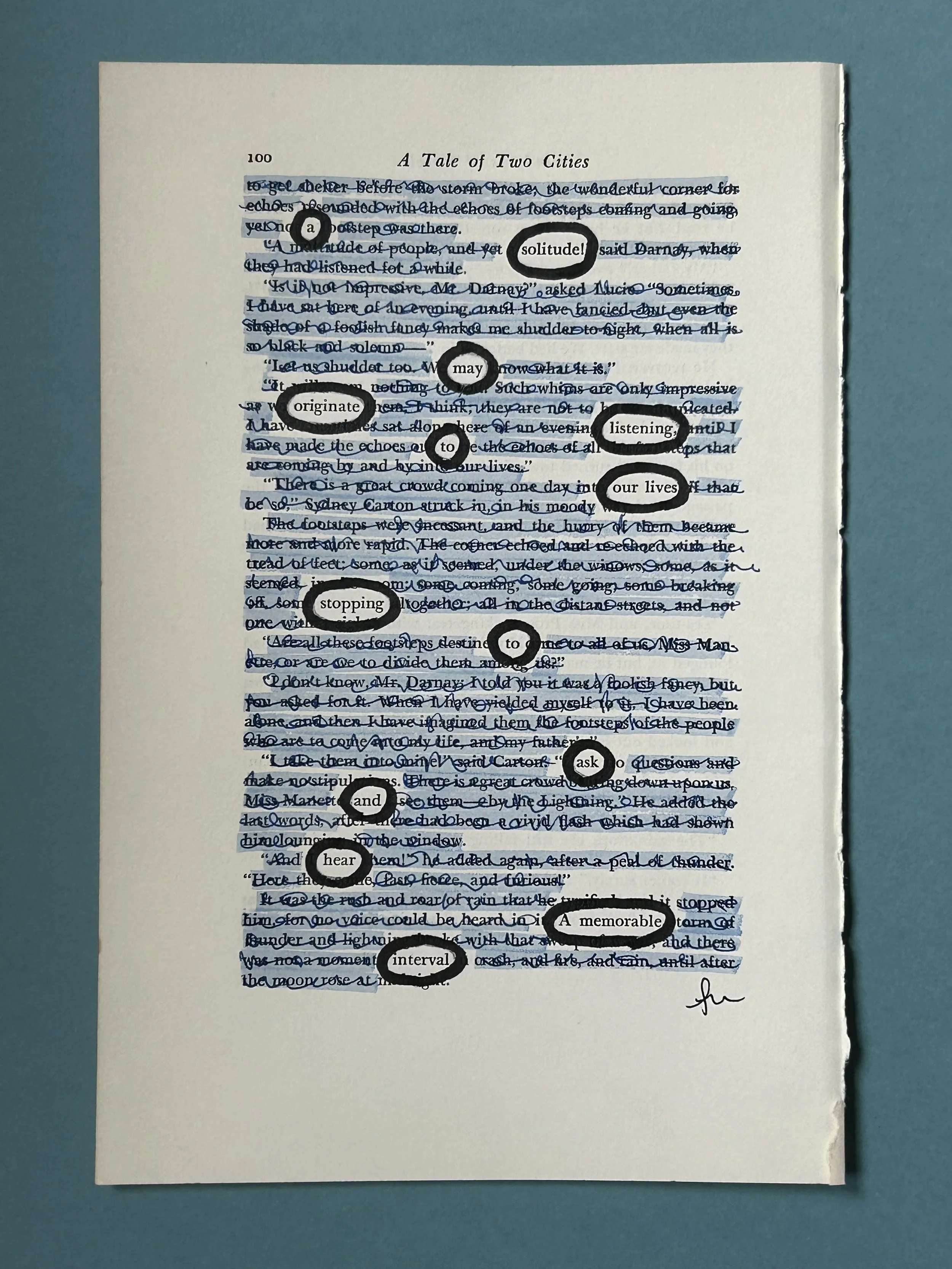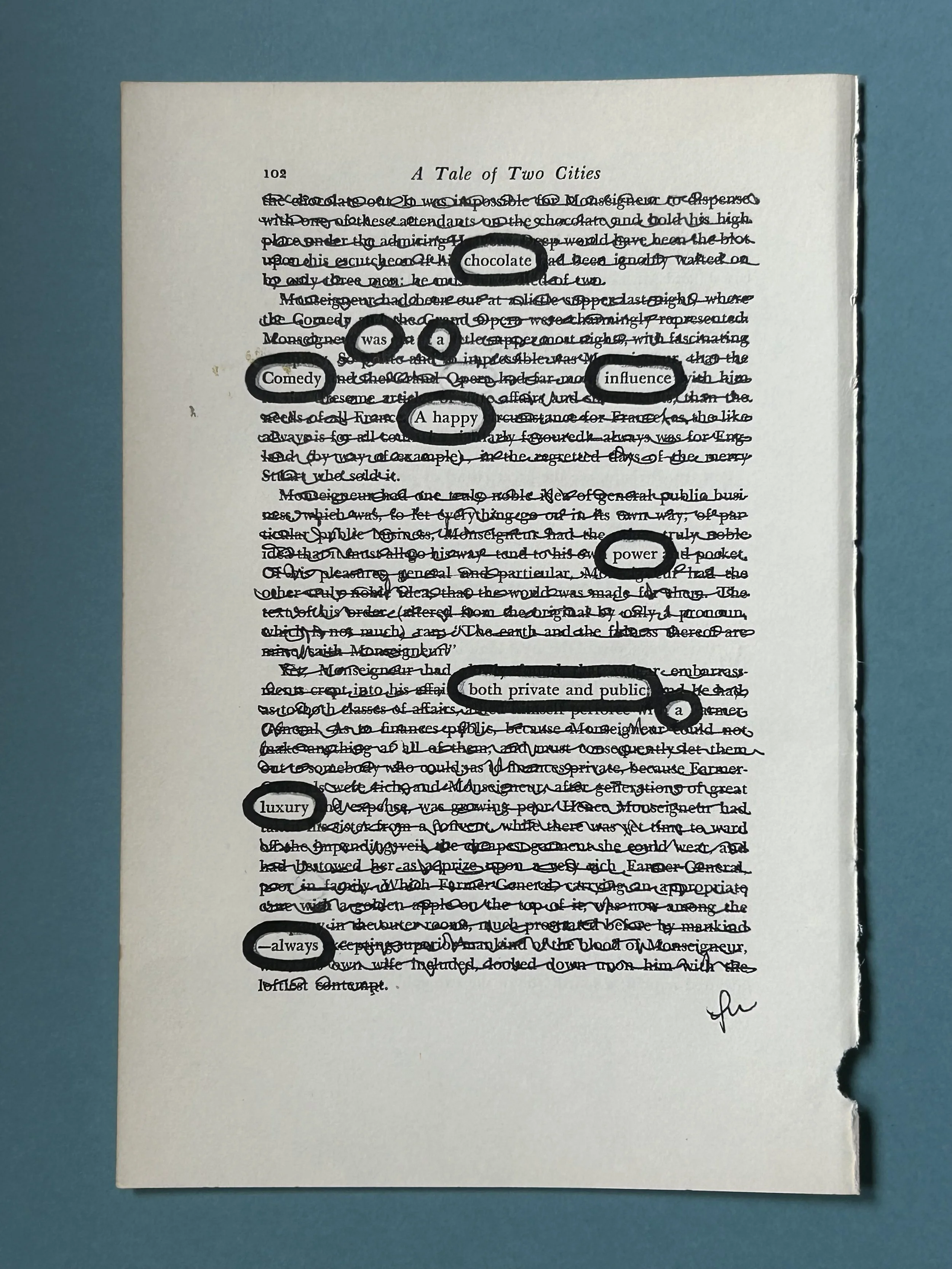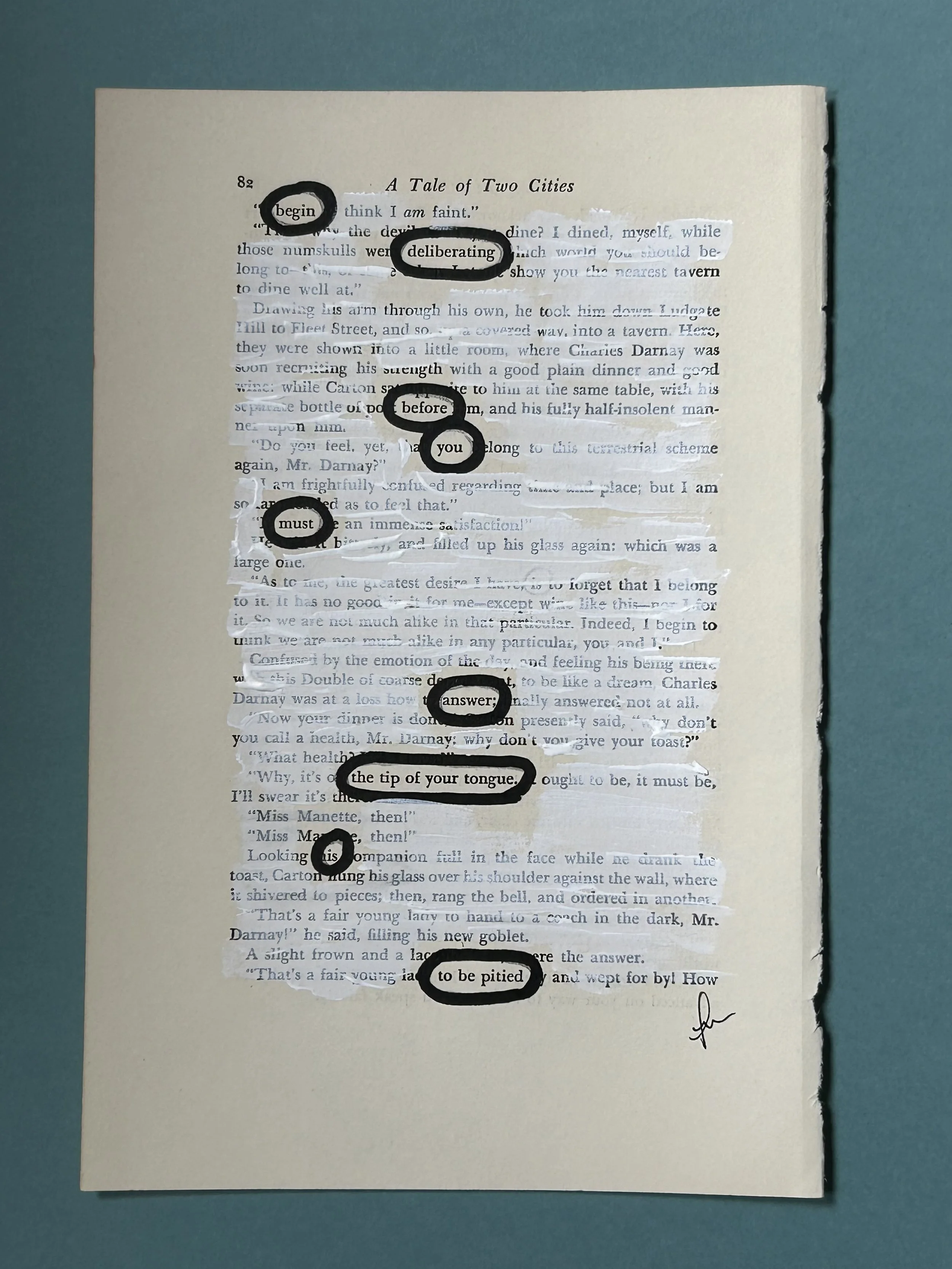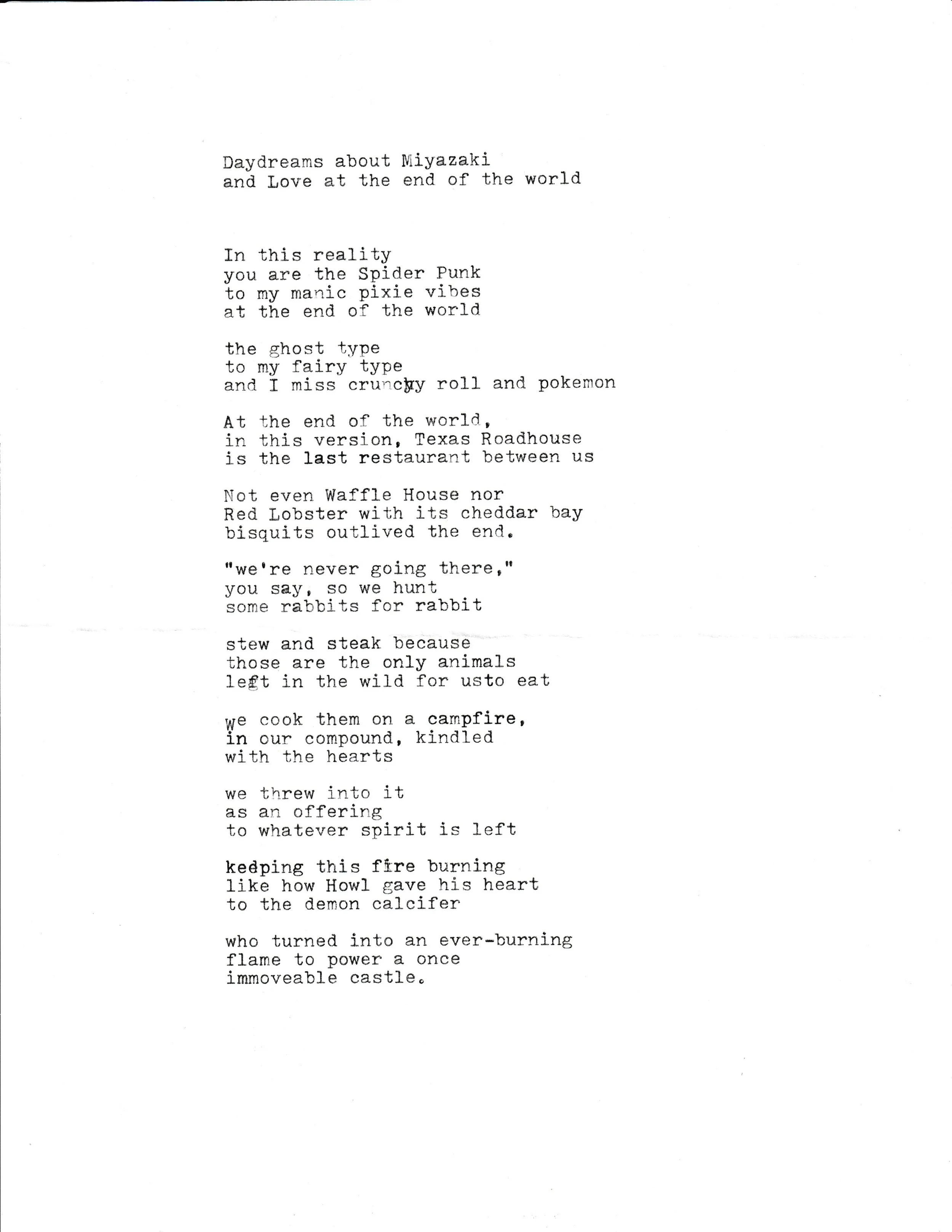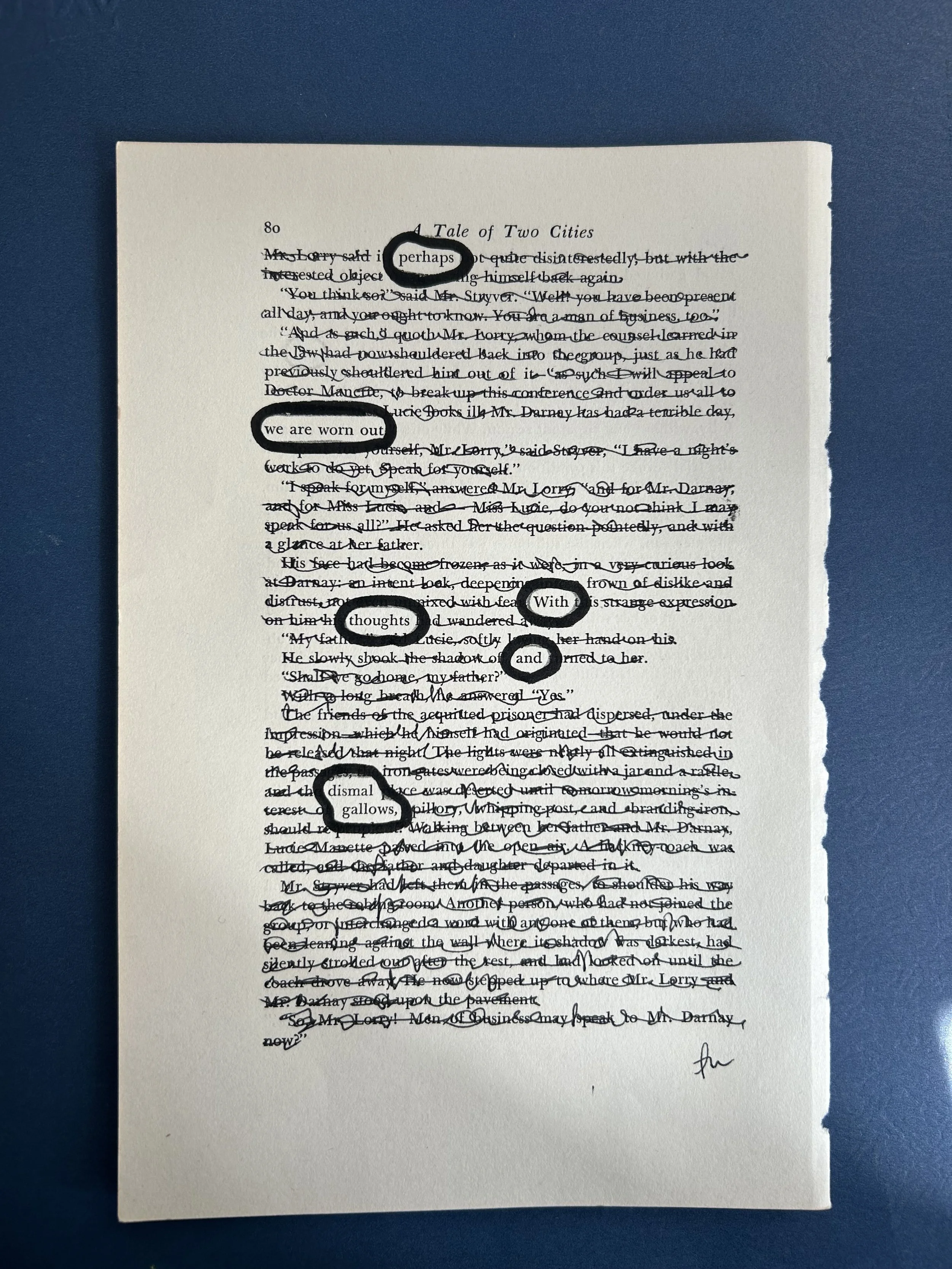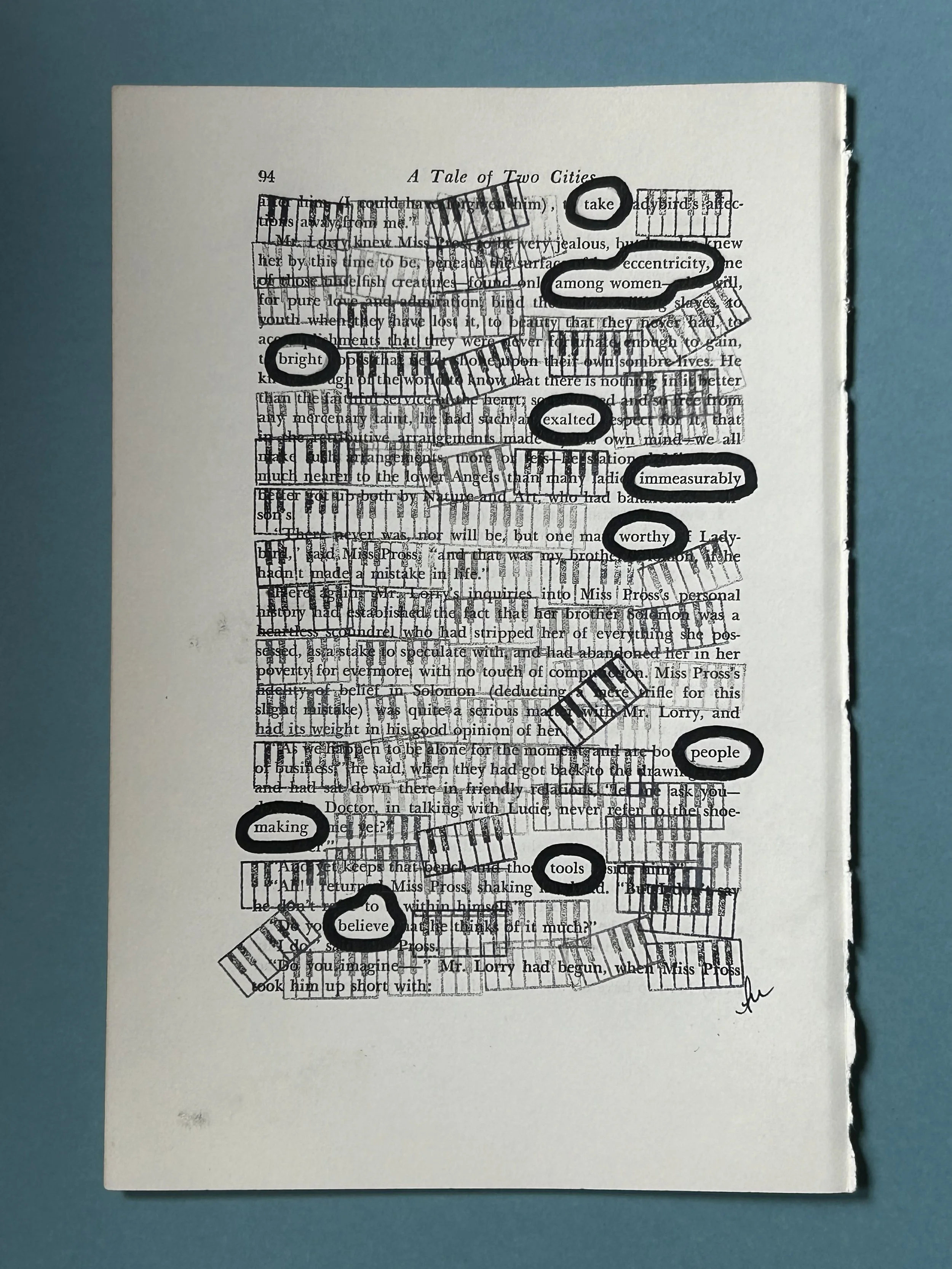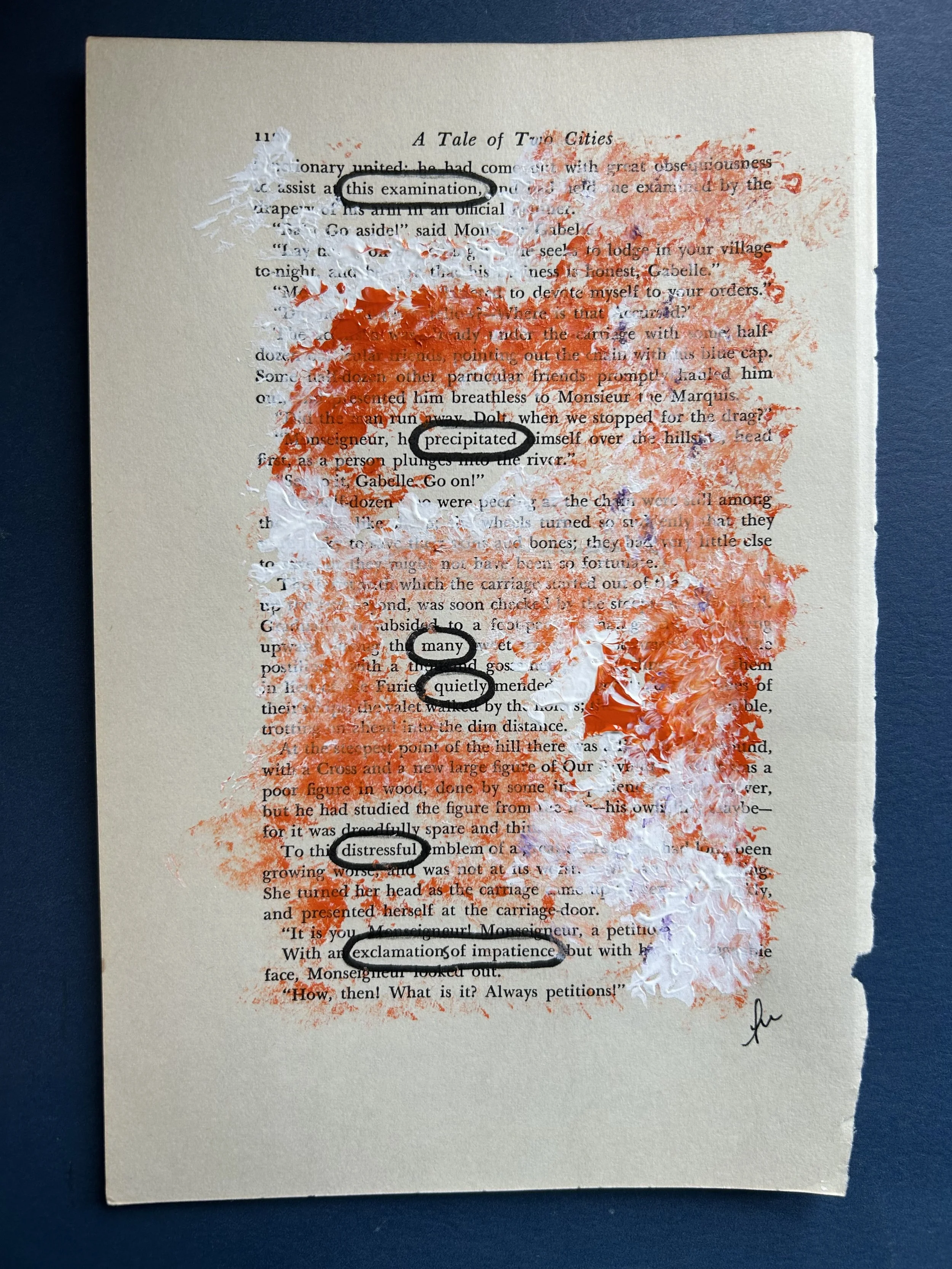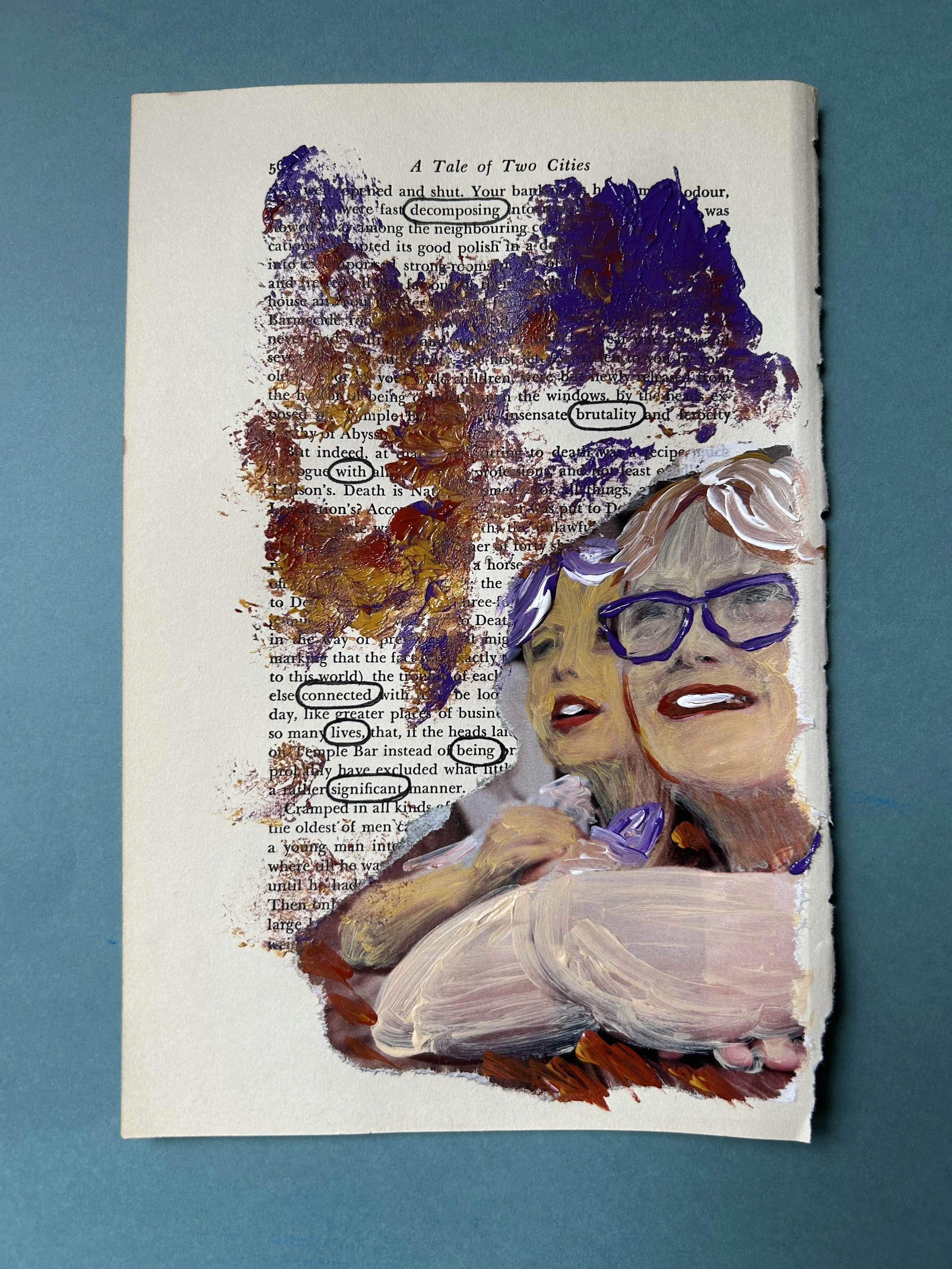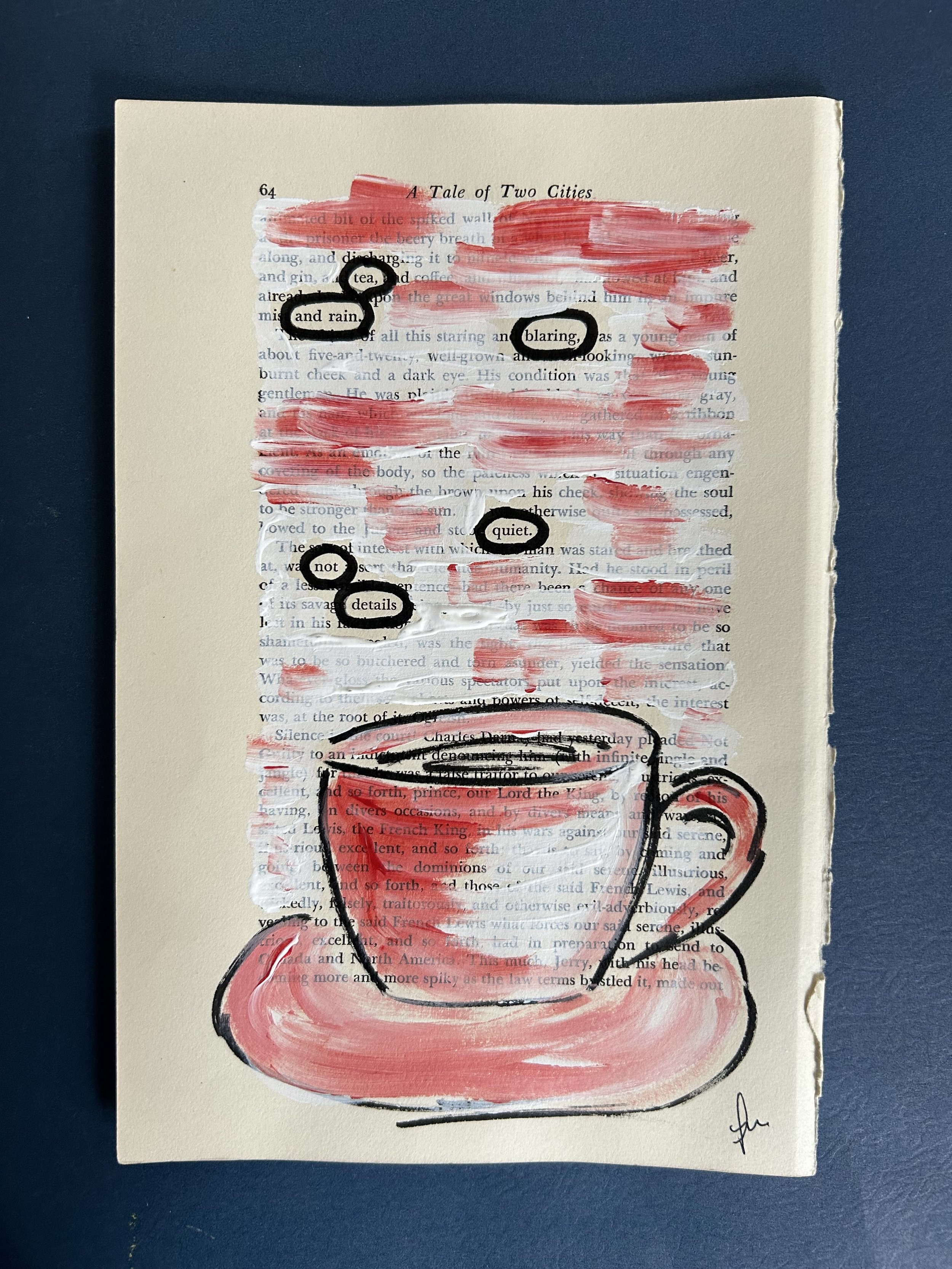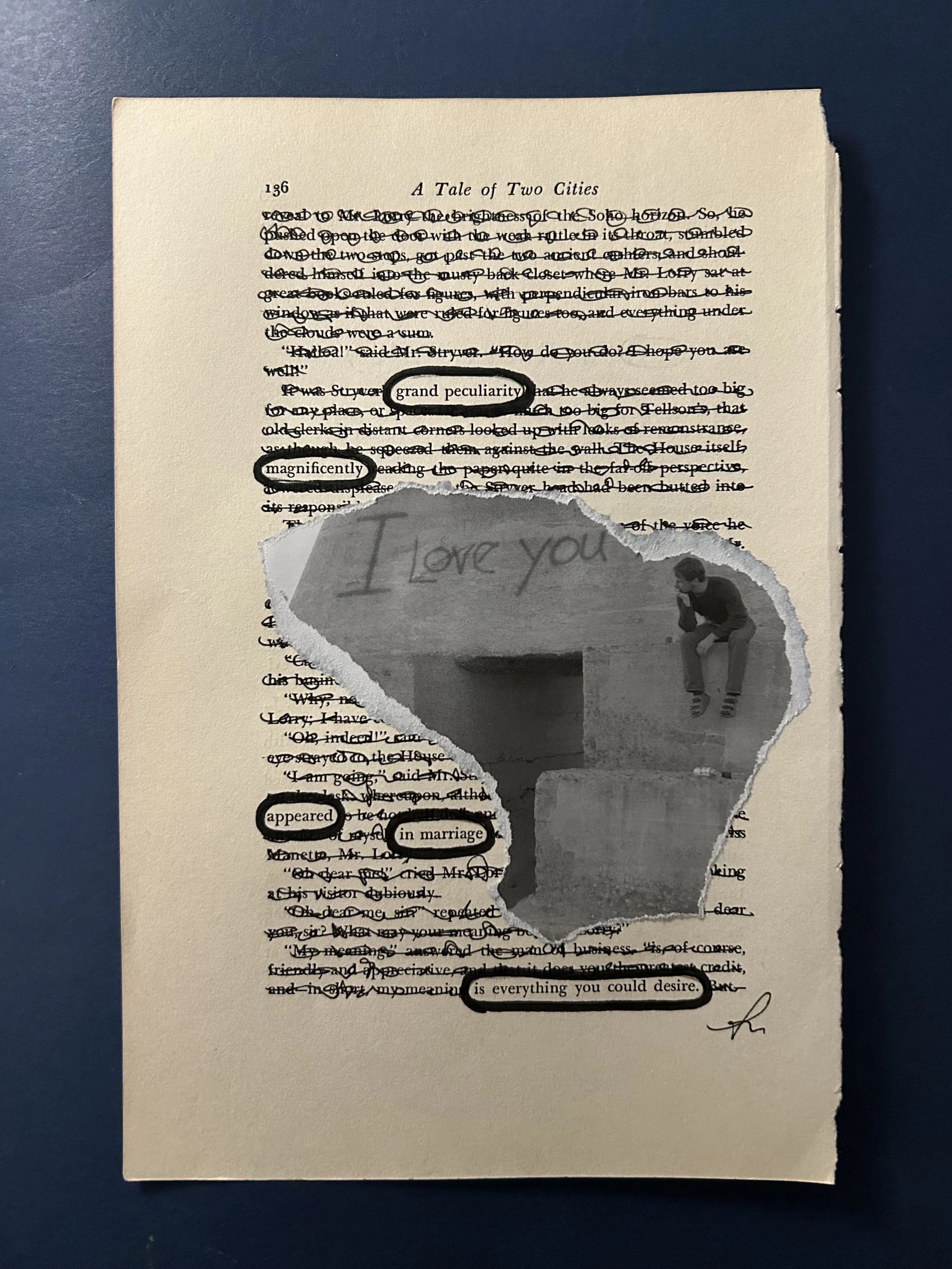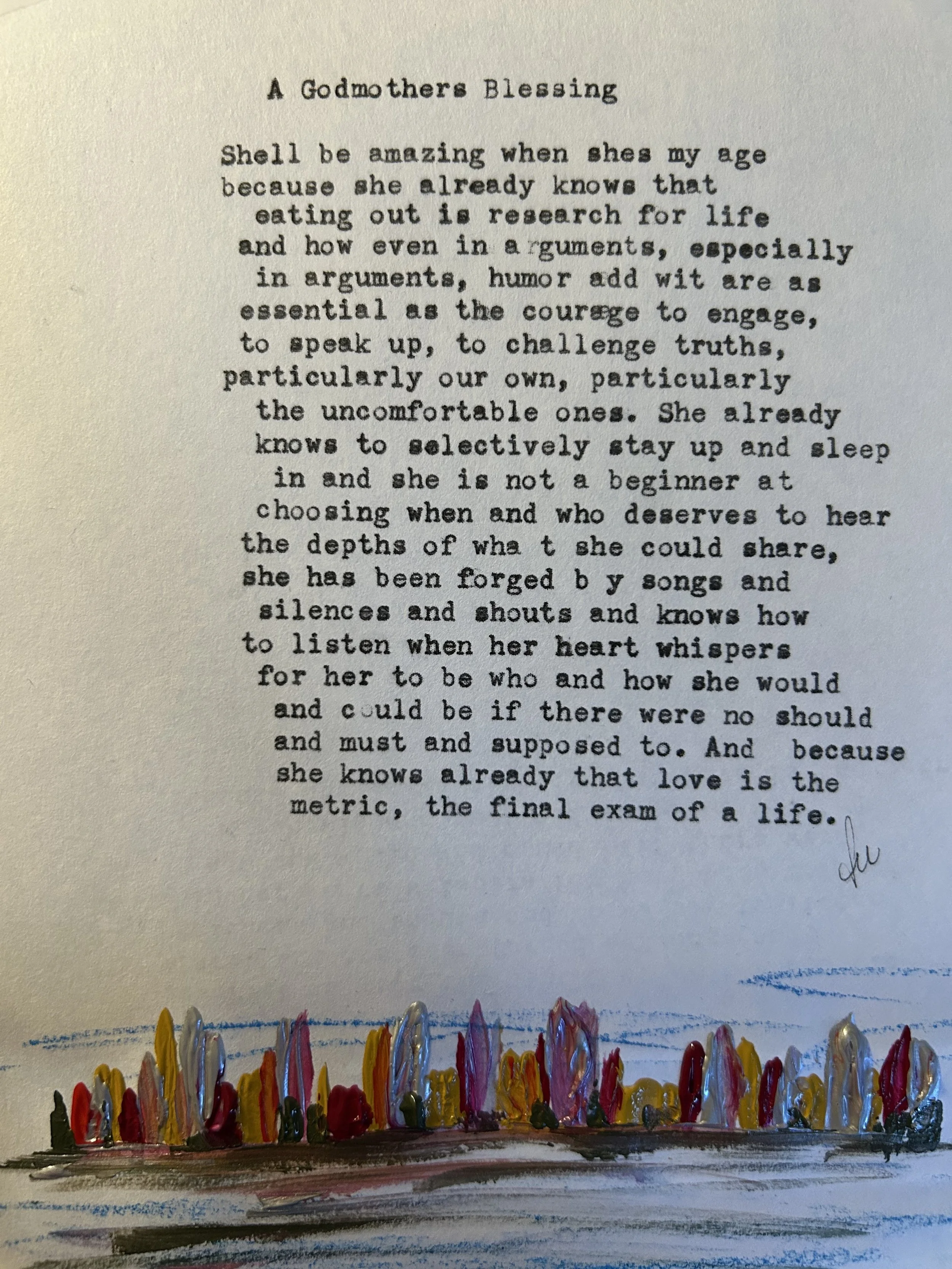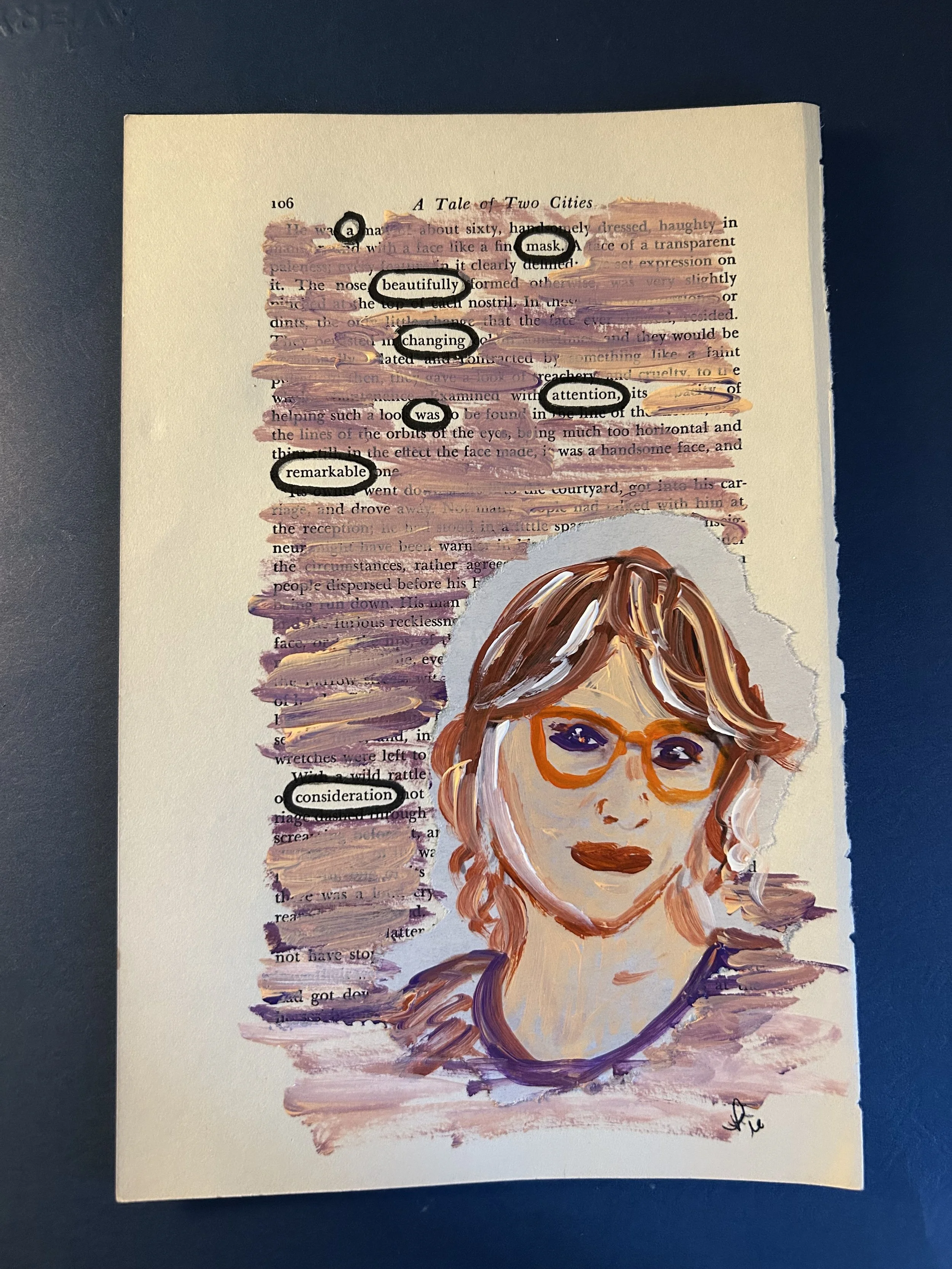Welcome to the 30/30 Project, an extraordinary challenge and fundraiser for Tupelo Press, a nonprofit 501(c)(3) literary press. Each month, volunteer poets run the equivalent of a “poetry marathon,” writing 30 poems in 30 days, while the rest of us “sponsor” and encourage them every step of the way.
The volunteer poets for March are Kathleen Bednarek, Mymona Bibi, Amy Haworth, Susan Hankla, Christina McCleanhan, Elizabeth McGraw, and Alexis Wolfe.
If you’d like to volunteer for a 30/30 Project month, please fill out our application and warm up your pen!
March - Poem 3
Window / Kathleen Bednarek
-thinking of Lorine Niedecker
Portal into field
Unchanging frame
Unknowing
Wyoming
-
Green & brown dots for cows
My body with its eye-
rises
A piece of paper rolled-up &
Stuck in the hole
In the screen
To keep the mosquito
Out
How I learned words
Given to the sky
Now read out loud
To the mountains
Over my book
Time / Mymona Bibi
there are some
who are great
with time,
they swim through
it or it swims
through them
and their fingertips
never wrinkle.
instead time
is something
i choke
on catch
in my throat,
spit out
and lift
my head to find
spite in my eyes.
when the time
swimmers float
towards me,
the clocks
break.
i am elated
by the witch
from my nightmares
who kisses
my forehead,
plucks time
from my throat
and tells me to
swim,
i dive
into the pool.
when my head
resurfaces
the sun rises
and i smile
in pain.
what a pleasure!
to feel this body
in another body,
the clock face
relaxed.
tears are nothing
but calls
to ocean.
Mother's Shrine / Susan Hankla
In old albums, sometimes they've cut around a picture
and stood the inch-tall photo against the black page.
I have one of those of Mother (her splendid legs cut off)
I keep in a plastic box which I don't know what to do with.
It's by my keyboard.
In it, I've added a chip of purple glass I once thought was amethyst
until I dropped that brooch from my grandmother on my office floor.
Earlier, when I thought it was made of amethyst, I 'd sent it to my cousin's daughter.
She never thanked me.
Waiting too long for a note from her, I asked that she mail my brooch back.
After more long months, she tucked a nearly illegible note to send
with the pin. Her chilly little message was about the nature of misunderstanding.
She never knew her great grandmother, but what I wouldn't give
to have got a thank you note from Ruth mentioning the heirloom. Not being thanked
made me lonelier than ever, ever I was-- the butt of her joke.
One day Mother sends me a handwritten note.
First Friends / Amy Haworth
My two friends would come to play
Board games and Barbie dolls
From 10 to 2 we'd huddle down
Happy as we could be.
My two friends would come to play
Until there was a fight.
She threw a fit and yelled and screamed
Until the other cried.
My two friends would fight each day
And then I'd set things right
With mother's tone and lessons taught
They headed to their home.
My mother asked if they had left
(I knew she could not know.)
My friends, you see, were made of air.
Alive to me alone.
One left behind when we did move
The other came along.
I never wondered where she lived
Or if she had home.
My two friends would come to play
They were mine alone.
Ghosts or angels — who would know?
For I was not alone.
Please Exit the Ride to Your Left / Christina McCleanhan
To understand is to land
beyond
the chewed rim
of your styrofoam cup.
at the party
we were laughing
haha
hilarious
Hey...
come back,
come back…what happened…
to the Santa hat?
haha
hilarious
like most,
our evening passed
in silence
haha
hilarious
then, there were
only voices left
to adjust
only seams left
to patrol
no need to stage my nightmare
with your spotlight guillotine
my eyes were already wide
when we
walked
to the fenceline
the stars
that night, they wept
A Refresher / Elizabeth McGraw
Sitting in the chair under the glare I see my skin sink and dull.
Color at the roots tips left bare, lipstick still bright red.
I am hoping for a miracle or just a small nudge further from dread.
The clock is ticking.
I've actually somewhere to go but they won't know where I've been
except for the clean trim and filtered smile
that shows I am ready to begin again.
The candle, not quite a tealight / Alexis Wolfe
the candle, not quite a tealight
waves its neck at my eroding
spray roses; their water is milk
March - Poem 2
Zero Days / Kathleen Bednarek
Last night I was met in a dream by a man I had never met before. His face, a composite of men who have worked in body shops or out in the cold. A traffic flagger. Large, red-faced, longer gray hair flowing out from under a baseball cap that said Semper Fi. I arrived in this dream not because I am a Marine, but maybe because my sister recently told me over the phone: Semper Fi, short for Semper Fidelis, always faithful.
The man across from me told me he drank Busch beer from the time he woke up, and that it helped him to come to the shop already on his way to blotto. Lucidly, I noted PTSD as a possibility. I don’t know, what rooms are we ever in when we confess? I can't recall. The emotion normally overtakes the atmosphere.
No one confesses anything unless they can't stand it any longer but the spaces stay. I listened to him and didn't say a word. Even in the dream I never had him do work on my car.
My sister conjures humor from depths, sourcing Bloody Marys in Civil War-themed restaurants during snowstorms staving off the lack of light. Sweatpants and high heels juxtaposed, with an old winter coat for a quick jaunt to the supermarket. You know this is the America of spray cheese. Of Powerball. Of poverty, that's different from other countries' poverty, because it dies of heart. If you give someone dreams, there are those who know the turn. The empty-handed side. Here you laugh. And I shake. But no one will know what kind of shakes. Was it from laughing? Who goes there?
Zero days. A Brad Pitt movie, exited in near darkness. What kind of people are in your dreams? Where are you all sitting, can I sit here? I've been in many rooms. I recall blacklight, deeply cushioned furniture, wood-paneled walls and conversations I no longer wanted to be part of. It was to leave them to return to myself. A different dream. Now it’s Sunday, I'm facing a bare-limbed forest, a winter that won't quit. I think of you enduring. Life will make you its mercenary—pick a song to go into battle with. Dance with it in your room.
Orange / Mymona Bibi
Like the start of a morning or end of a night, orange is tomorrow it’s believing we have a chance it’s the aura of hope. don’t look at it, my love, for orange burns, stings, in a wound as i cut open slice through orange, strings of white, orange, find you in two-toned fruit and one toned flesh, each segment falling, rocking, boatfuls of juice on a small plate. it’s a kiss and the fire left behind on lips and tongues, lighting departures in alleyways. orange is a street full of us, is my knowledge of floating rings and shining jackets and emergency flames where we beg our abusers to save us because no on else is left.
Untitled / Amy Haworth
I weep for the girls
who will not see
another sunrise
who will never know
this girl
cries
for the girls
who I have never seen
but imagine
holding
their mother
I've never met
in this lost
world
where they should
have come home
from school
today.
I Had Two Childhoods / Susan Hankla
One in which a father betrayed me.
One in which good women saved me.
So really I had no childhood at all.
But why get all psychological?
I know how to make biscuits you can see through.
When Courage Fails / Christina McCleanhan
Let depression’s horror sweep across your feet
before it rises to probe your sacredness
with its clinical fingers.
Offer your shoulders
to the heaviness of jealousy’s resolve
if forgiveness feels shallow and useless.
But, do not stop dreaming.
Raise your head and watch the sky,
wait for the rabbit’s jump
from the tall grass
behind the abandoned white house
with mismatched clapboard siding.
The dogs will wait or walk; the dogs look after you.
When fear comes
to pour itself along your breast,
greet its sting
like exposed flesh
reckons with a January coldness.
Welcome reflection
that means to forge your buyer’s regret,
compressing your wounded foolishness
into a proud thickness
that may take another week or year to mold.
But, do not stop breathing.
Slam your fist down into the dishwater,
rest while the countertop slant draws the suds
toward the hidden mildew behind the faucet.
The guests will eat or starve; the guests came for you.
Recognize / Elizabeth McGraw
Call it like you see it, what should I call what I feel?
Wait to perform when I know I am liked,
but they won't like you until you perform.
I am a monkey.
By midday / Alexis Wolfe
By midday everything is slippery-wet
flubber, my hands are two sieves
and i’m hyperfixated on the notes
of a vacuum-sealed Bookkisa coffee
bag again: florals, meyer lemon, melon––washed
process, weren’t the last: meyer lemon, peach, bergamot?
Why all these lemons, melons,
where there are none? Everything
is everywhere. Coffee is coffee,
not ripped petals, drenched fruits. I drink it.
I read about the detrimental effects
of globalization: our foreclosed future,
earth mass smashing
into the continuum of past and future,
completion as a limit and the time
of the finite world beginning. Excess, meet
excess meet excess, you’re all the rage
lately—enjoy a cacophonous
conversation.
The sourdough loaves cool and talk
amongst each other on my countertop and
it excites me–i don't know
who I’ll gift them to, unable to eat.
I say I can’t write anything lately,
but then what is this? What is anyone
talking about anyways
on my kitchen blah blah blah
radio, through the nightshade, at the local blah
blah grandmother-dedicated
restaurant. I don’t care.
Of course I do.
March - Poem 1
do you follow me / Kathleen Bednarek
if today the blue sky
without saying a word
lent us its promise
today the sun returned after the snow
unearthing a lost earring
ordinary mysteries accompanied
by the caw of a crow or two
if to start this poem with their sounds
but they clutter the blue of the sky
if as it turns out makes everything a question
today i am content to be curious
do you follow me
i hope for a way through
i don’t know how
Nightshift / MyMona Bibi
dust off the broken glass
from the floor
at 2am on your knees
in the shuttered shisha bar
where ginger coffee once stained
the rug where blood
was almost spilt
where your nights were paid
for by a boss plagued
with prejudice that cuts
deeper than the shards in your fingers
as you miss the sand in your eyes
from when this country was only a mirage
tiny fickle little dreams die
on boats or drown
nearby loss collects in living bones
knees click back up loud
like returning from sujood
during the last tarawih hands clasped
each other shoulder to shoulder
no space left for anything
but a child chasing futures between praying
legs snap back to silent jabana
a black memory against white
reality as the kettle whistles
and skin is punctured so realise
that I’m just a night soaked voice
on a phone and mourning eyes
from the street even birds
won’t sing in as your body falls
to the floor and you find the missing
double-six domino tile
from the game you would’ve won.
Bus Station Mishap / Susan Hankla
What looked like my yellow Samsonite suitcase
was full of car parts. Back then, you called the person to arrange the swap.
It worked fine. He came to me with my dresses
and underwear, his suitcase a lot heavier than mine.
We laughed and were grateful. That suitcase I’d picked out
at the store had exploits. It went to London. It went to Sweden.
Once I flew from Virginia to Providence
with a new frying pan.
But Aunt Marjorie’s jar of cherry jam
was leaking. She could never manage to get it semi-solid.
I scooped the red stuff from inside the corners of the yellow suitcase
with a serving spoon and spread it on Sally Lunn bread.
Sixteen / Amy Haworth
I wish you would talk to me
like you did
when you were 10.
When I was your everything
and you were
my soul.
I wish I could return
to the moments
you wouldn't let me go
to bed until
you had fallen
asleep.
I was so tired
it hurt
back then.
But your need of me
hurt different
than now's disdain.
They tell me that
you'll be back
again
But never again
in the way
that we were
When we managed to be
only because
of each other.
For the One Who Did Not Call / Christina McCleanhan
I know, I know, you are uninterested.
Today, there was spring warmth.
We may live in a world of phobias, so I beckon
the blackbirds with a faithful hand.
Let them carry away my orphaned willingness.
It is no worse than the straw from my yard that will build
their spring nests.
What will be, will be.
I know, I know, you are exclusive.
Everyone is a neighbor when your heart is breaking.
New friends ask what they do not understand.
What happens when you are angry?
How did you keep walking?
And when my answer is slow to come, old friends push.
Were you angry that summer? That afternoon?
After it happened? Why did you keep trying?
In silence, my mouth is too often parched
from the stale dryness of the words
imprisoned on the tip of my tongue.
What has passed, has passed.
I know, I know, you are an intellectual.
Tonight, a late-winter chill has replaced spring.
I have seen how people hurt others; I am tired, now.
I have felt innocent hope destroyed by barking thieves
who search for diamonds in the water bowls of poor folks,
crippled by a debtor’s loneliness and no heat.
We must first face what will be changed. Understand?
Whim / Elizabeth McGraw
Fuck. I forgot.
My whim and whimsy and talked out loud.
Sitting in a kitchen I held the hoops close to
my ears and smacked the gum real hard.
Oh, no I heard them gasp.
I spit out the gum.
Reigned myself in.
Sat on my hands.
And spoke better next time.
Fish out of earthly water / Alexis Wolfe
Understand this: if you stumble
across a quiet, enter.
Lately reading too
many accellerationisms ecotraumas
races for superintelligences deportations
before dawns sentient hells razor wire
blueprints dividing dreamt up-transnational-
national parks imperialisms phones mistaken
for guns 5G aromas Balenciaga apologies
dissolving hyperrealities CGI-generated modeling
agencies children falling invisibles phantasmagoric
agglomerations plunging birth
rates Costco expansions elitist cannibalism boyscout
camps 3D printed kidneys / coral reefs AI-induced
psychosises baking competitions competition
competitions western wear catastrophes
deepfake porns Juul-induced popcorn lungs
washing the shores razor wire border walls
dividing ideally-transnational
national parks—before calls and petitions
for big bend’s wall
we would float in the Rio,
one foot in Mexico, frontera invisible,
frontera nothing but mudded grass, misname
the constellations (which are the same
on either side). Springing between hot
and cold river, we were fish out of earthly
water, we would find
some quiet place,
enter:
February - Poem 28
BROCHURE FOR A DREAM / A Cento
composed by Ashby Logan Hill, with lines by and from Kristine Anderson, Barbara Audet, Bee Cordera, Ashby Logan Hill, Amy Marques, Sonia Sophia Sura, and Samuel Spencer.
As far as I can tell, the only laughter came from me,
thin emerald leaves rising from the dark, shivering earth.
I can hear the morning rain pattering on the leaves.
Outside my window, the heart maintains its worth,
everything you could desire. I’ll think of stepping outside on a
clear night, trying to count the dots of glitter in the sky.
Some moments are too precious. This beauty seemed to
speak to me nightly in my dreams, your dancing in the
sky, captured in eardrum hollows. My body and soul are
riven now because my heart is where you are.
Touch me too firmly and you will get burned.
Like the Earth, we are made of dust. Please accept
this. It was an unlearning like this that taught you,
sometimes the best song is silence, something new.
The 30/30 Challenge: Twenty-Eight Days Later / Kristine Anderson
And the end of all our exploring
Will be to arrive where we started
And know the place for the first time.
—T. S. Eliot
It’s like the family piling into a station wagon, 1968, driving
from the California Bay Area to northern Washington, hot as blazes
through Mendocino County, raining cats and dogs in Crescent City
and all the way up the coast from there. Then, arriving:
My first bee sting outside the motel room I shared with my sister.
Smiling at the uncle I’d met only once, learning to make pie crust
from my grandmother, already stooped from all her hard years.
The point, though, is after a week with little-known relatives,
after hotel swimming pools and diner hamburgers,
after the long road back, once Dad parked in the driveway,
I, at twelve years old, carried with me the revelation of a bigger world
and walked into my bedroom with its hand-me-down bed
and old wooden dresser, the blue braided rug warming
the hardwood floor, while rising around me: welcome
familiarity, electrified with new anticipation.
Don't you feel it, too?
February Haiku No. 2 / Barbara Audet
Stubborn ice-bathed land,
Gets mocked by all teasing warmth.
March prefers to roar.
On Black Love / Bee Cordera
Like moonmilk flowers
cradled in waxy evergreen leaves
blooming like they always
have for millions of years
upon the summer breeze,
heavy on the branches of Magnolia
slowly, but surely, gifting
their sweet scent to the beetles
who have always opened up
the flowers to polinate them.
Durring the land before time
when there were only slow
sunsets moving through hues
of blue, gold, grapefruit pink
we are those tumbling flower
beetles making the Magnolia
bloom look easy, bold,
ancient as breath.
MASTER SONNET #2 / Ashby Logan Hill
At the Monet exhibit I asked about the cold you don't remember, Alaska.
Not even the roses could compete, a dalmatian and carrier pigeon, friends,
the heat of a summer breeze sweeping through the night, then daylight.
This beauty seemed to speak to me nightly in my dreams.
So, feeling enlightened, tonight we slept with both our eyes open.
Secretly I wish for you again. The rain keeps our hearts forever.
“I love you like the dew at break of dawn.” “I love you like the morning tide fading.”
It was the rain in the night, the early morning light that saved us.
“I was wondering when you’d come back up to see me.”
At the light, I was reminded what magic grows of mountains.
At dawn I’d find the foxes lurking, smiling at my counting.
Standing there waiting for me on front porch like fire, glowing,
this second chance at breath you hold a bit before breathing.
We drove into the dark, into the night. We were chasing the light.
Mended / Amy Marques
Exhaustion of
realisation
& misgiving.
Then:
mended;
seeing good.
Source Material: A Tale of Two Cities
Endings / Sonia Sophia Sura
How do I write about endings?
A bird flies away;
A meal’s last bite is chewed;
Eyes open to the morning light.
On the other side of the end
Is a new beginning.
On the other side of a no
Is a yes, and
Yes, and
Yes to something else.
August Something, 2025 / Samuel Spencer
You help my hand
and for a brief instant, I believed
that everything that had passed
through its palm was merely practice
for this moment. All its dexterity, all the
fine motor skills gains performing other
tasks – the racquets, the pens; all the minute
movements I’ve trained its tips to do.
For decades, this hand developed
its Life’s Work, relying on the calluses
formed from holding onto the wrong things
or holding onto things the wrong way –
Only for it to fade away, its form
enclosed in the shape of your own.
I never knew a hand could feel
at home, that it had had reached for
now seems so vain in your simple grasp
on that sunny day in London, in the park
whose name
I can’t seem to remember.
February - Poem 27
My Friend, Let’s Remember / Kristine Anderson
Snapdragons
like the ones your mother planted in the backyard
sun-yellow and lavender and white
strength, mystery, protection
The duck
that wandered into your childhood, which you adopted
quacking as it waddled in the yard, teasing your terrier
grit, fun, adaptability
Chocolate
as in Halloween or Easter candy, but also in baking
Christmas cookies every year, a sweet endeavor
a small luxury, a gift, celebration
Your cocker spaniel
the puppy a gift from your father who was dying from cancer
moving with you to a new home with its impish pleading eyes
loyalty, affection, playfulness
One could do worse than have such landmarks along the way.
Justice / Barbara Audet
… Bold self-creating men did statutes draw,
Skilled to establish villainy by law;
Fanatic drivers, whose unjust careers.
Produced new ills exceeding former fears:
Tarquin And Tullia/John Dryden
Self-shady men ever negotiate the penchant
To vanish faith, duty, decry mercy as an attribute.
Dryden’s villainy secured by law is ever true.
New ills, new fears, fruitful times of wickedness
Are willing stand-ins, holding permanent,
Planting gardens of seedy plotters, overgrown patriots.
Evil does not deserve to be redundant.
The poet wrote, “innumerable woes oppress the land,”
Did his insight leapfrog down the centuries to cast a searchlight
On baffling justice, the lacking of, that holds nations hostage?
ELEGY FOR A SECOND CHANCE AT BREATH / Ashby Logan Hill
Standing there waiting for me on front porch like fire, glowing,
as sure as you are that you still breathe, a heavenly thing,
brought down from sky to earth, as Faith is an angel,
you take all of the air that you can in, release what’s not given,
swift as a brisk wind, cold enough to freeze over, like the
Dry River high up and out of sweet light, for you a
second chance at breath, longing no more for what is lost,
instead for all that breathes and sings holy — Faith is her name,
a way to be whole again, ducks by the shallow pond and
green fields of morning, our walk through Central Park,
and all that remains holy is night — the night, our endless,
sleepless night that brings, sings with it our joy forever.
It’s things like this that make a life. It’s things like that,
this second chance at breath you hold a bit before breathing.
Consider / Amy Marques
Consider looking
at attitude
his whispered
anxiously unattended
suspicion
his untidy reckless
demeanour,
his sympathy
which made him
turned
back
and paused.
Source material: A Tale of Two Cities
I do not want to live a life that is boring / Sonia Sophia Sura
I do not want to face my journal and have nothing
to write.
I have already lived a thousand lives in this one,
and I’ve recovered enough of my parts to live
my present moments in one body.
My soul is all-in this human-thing and I am praying,
meditating, cleansing, bathing.
I am calling on all those higher-ups,
the most unconditionally loving
archangels and
elevated ancestors
and my highest self.
We are all here,
cherubs surrounding me with their
cute faces and
white wings and
deadly bows.
I am impenetrable.
I am light shining so bright,
touch me too firmly
and you will
get
burned.
February - Poem 26
Yesterday Morning / Kristine Anderson
The sky unfolded
pink against arctic blue
as the sun made its way
from the horizon, upward;
in minutes, the snow glistened
after the overnight freeze,
trees as still as mannequins,
rooftops seeming soft
as fleece, sparkling
as if sprinkled with glitter.
Soon the sun would begin
the day’s melting:
snow clusters falling
from burdened holly leaves
and pine needles, cracking,
shattering on the ground.
But those early minutes, a simple
palette: pearl white of snow,
rich-brown boughs of trees,
and above, the splash of dawn.
Unfolded / Barbara Audet
One silk scarf, peacock blue and emerald green, is folded
Neatly in the top dresser drawer.
Not yet worn by a soon to be previous self,
a woman who pre-daring
knows practical pearls and matched black suits.
She suspects there’s freedom in the folds, lying pressed in wait of assignation, more sultry than sinister.
Unbusinesslike, unexpected,
Untethered though angle regulated. This painted seascape lies in hiding for the perfect gust of a gale of independence.
Light / Bee Cordera
Sometimes we see you sometimes we don't the times we do, evolution, love imigination, co lor beauty, and all life's metaphors we need you for that inspiration. And we dont to know our inner selves.
ODE TO THE STOVE PIPE AND CREOSOTE / Ashby Logan Hill
At dawn I’d find the foxes lurking, smiling at my counting.
Herbaceum, perennial bloom that feasts in sky like translucent moon
or fire smoke in stove pipe fluming up and through the cedar.
Floorboards creak in the morning beneath our feet and the
felines ring their tails around our bare ankles dancing in the
morning naked with ash and dew, how slowly but surely
the sunlight climbs over butte-magic of morning, ember-glow
transfixed in galaxial transfiguration, a bowl of warm milk,
the magpies circling, a gaggle of geese swirling, and flock of
sparrows above the treeline murmuring. You could see my
breath this morning on my brief-brisk walk out to the wood pile.
I wanted it to blend in with my soul of creosote-smoke, of my old
country home, white stucco and terracotta stone. And you, sweet
standing there waiting for me on front porch like flame, glowing.
Deference to Will / Amy Marques
Knowledge was privilege; a gentle deference to will.
Source Material: A Tale of Two Cities
BURP! / Sonia Sophia Sura
That incredible sound is called a funny word.
I wouldn’t call it that if
I were to name it myself…
My mom calls it Disgusting!
and rather tastefully, Rude!
When I do it, I feel proud!
I must have done it when I was a baby,
but it took 18 more years
for me to burp regularly.
My burps are a celebration, a release…
I call it an Achievement!
and Did Ya Hear That?
When Max does it in my bedroom
or in the kitchen, he does it so frequently
and so LOUD, I announce,
That Wasn’t Me!
I Did That! Max shouts.
And he sure is proud.
February - Poem 25
Neighbors / Kristine Anderson
Three of us in the parking lot
to charge phones in our cars
having shoveled out
after the plow went through
following yesterday’s snowstorm.
Still no electricity in our homes.
“I have extra batteries,” one neighbor offers,
“if they’ll work for your flashlight,”
and he trudges through the slush to fetch them for me.
A family lugs bags of clothes to their van.
They’re taking off to stay with relatives
who have lights and heat and warm food at home.
Before getting in the van, they ask me quietly,
“Will you check on Henry next door? It’s so cold.”
Henry, 86, returns with the promised batteries.
“I’m good,” he says when I ask. He points to his heavy
coat. “I wear this inside, too.” He shrugs. “Besides,
today’s sunny. The condo’s warming up.”
A teenage neighbor slows his bicycle through the puddles
of melting ice. “Hi!” he says as he rolls by.
Then he adds, shivering a bit, “It’s cold!”
Yep, I nod, and think,
but it’s getting warmer by the minute.
Presence / Barbara Audet
Dedicated to Ed
I often hear your voice though the room is quiet.
It starts as a whisper not in my ear but near my eyes.
Like a knowing breath nudging at facial corners, sounding
Resounding, untapped from an ordained rendezvous.
Aligned with no scent of you, just a breeze of you,
for the purpose I conjecture to connect us once more.
And what do you whisper in these logic-loosing talks?
Encouragement, occasionally. Advice, more often.
Is is for me you call or for you, to keep alive in some way,
Substance supernatural to forego death’s true nature.
Even as these words untangle themselves, I hear you
Reading over my shoulder, I feel your weight on my collar.
And I sense you will read them over after I have gone to sleep.
HOMEGROWN ABACUS / Ashby Logan Hill
At the light, I was reminded what magic grows of mountains.
My father’s tomatoes holding on like stone fruit on the wiry vines,
tent-pole stake and string-bent bulbs below the cherries,
sweet one hundreds, romas and other valley-ancient heirlooms.
We’d fry up some Jubilees and Green Zebras in cornmeal mix,
all turned over in garlic butter and buttermilk and dropped
in crackling, smoky-hot safflower oil. My cast iron mind was mine,
dark and sparkling like the morning sunrise. “I’d seen God
up there in the sky draped above the pillowing, billowed hills,”
I told you, pink gleam of cirrus slipstream. The birds chirped me
again awake although I didn’t want to have to wait. But I’d wait
for the night all night to whisper then sneak outside with a flashlight
to begin my arithmetic. I’d had just a few hours before first light.
At dawn I’d find the foxes lurking, smiling at my counting.
Asserveration / Amy Marques
Positively demanding
asserveration: a swarming
anticipation
of questions:
Whom to have been?
Source Material: A Tale of Two Cities
What the flub! / Sonia Sophia Sura
Flub!
What the flub!
The most beautiful
word in my vocabulary
is not glorp or glob
or blob or gleeb…
The most beautiful word
is flub.
Flub! Beautiful indeed.
I once lived with an artist
who lived with anger quite
not sparingly; he expressed
his emotions
rather
untamedly…
Well, once he took a liking
to my word,
nothing was ever as
serious as it could be!
“What the flub!” He’d
say as he stormed around the place…
Why, it was quite fun…
Here he was, with
anger expressed
in a silly way; He came
to almost adore it.
“Holy flub!”
is my sacred way of
expressing reverence,
“That’s flubbed!”
is my way of
expressing condolences,
and
“You flubbernutter!”
is the greatest
insult I could give.
As I use this word,
it spreads across the lands…
Nicole in Florida
tells me she’s using
it around her friends.
She has her own
rules and preferences…
Someday, I can only dream,
this word will reach
the millions!
No more road rage!
No more violence!
Learn to express yourself,
and make it fun!
Join the motion!
Just say
“Flub!”
Death of a Suburban Dog / Samuel Spencer
It’s a labor just to hold up
your heavy head, and yet you rise
on those old, frail, wobbly dog legs
to say hello.
You were in the kitchen, the furthest
room from the living room. Why?
When dogs die, they leave the ones
they love. Why do they wander away?
Is it so they can die in peace? Is it
so they can acquit themselves those last
few pitiful pets? Or, is it so they can spare
us from seeing them stiff without the life
they freely gave?
Why were you in the kitchen, Benji?
Don’t you know if you want to go
we have to let you? Don’t you know
we’ll never have the strength? Don’t you
know we’re not dogs like you,
and we don’t know how
to say goodbye?
Benji?
February - Poem 24
Sublimities / Barbara Audet
“Lives of great men all remind us, We can make our lives sublime,
And, departing, leave behind us, Footprints on the sands of time …”
Henry Wadsworth Longfellow
Search if you must but dare you find a woman, man today whose life’s sublime?
Transcendent over natural inclinations, not wayward from a noble path.
It’s convenient to profit, to abandon what poets cherished in a time gone by.
Where are those that set grand agendas, ideal swollen hearts ever in harm’s way,
Exalting bravery, in thought, and words, and action, others before self?
Few flash auroras, few burn purely in our current mass construction of the all for one endeavor.
But when they strike a justice-angered flame, are consumed by a starlike immolation,
these few who seek sublime achievement are best foot forward.
By generous risk-taking, those lit from within remind the rest that more is possible, good unchecked.
Our days demand we follow fresh-made footsteps, molded by the weight of bold mankind.
Otherwise, the sands of time are leveled flat, refusing to retain evidence of our passing.
On love / Bee Cordera
Missing you, someone I’ve never met
Is like missing a golden age
I have yet to experience
But feels right at home.
It feels like the vitamin D
Missing from my body
When it’s been cloudy
And snowy for two weeks straight.
It feels like the once prairie land
Missing bison wallows
Basins for holding rain
Wherever the buffalo roam.
You say it’s like missing
A phantom limb you never had.
We hope their we don’t turn
To dust before we see each other
Again in this lifetime, but even then
If we do turn to dust
We are destined to meet as dust
Bunnies finally combining
Into one universe.
APPALACHIAN APPELLATION / Ashby Logan Hill
“I was wondering when you’d come back up to see me.”
Cornfields and newts, mountain river gulley salamander,
Hessian mercenary, coal miners and moonshine. The hills
in Ansbach seem to keep in same time, one day Pangea split,
and stopped in the city, traffic light waiting, a man in a
golden hat rides by on his bike, past Manuel’s Laundromat,
large chromium swoop and flowers, daffodils for handlebars,
and I sit there thinking — green light, pink and yellow
lady slippers, astringents of bear corn or squawroot and
Sassafras tooth, parasitic phosphorescence, hypothesis for
the phylogenetic trees, clade and sister taxa and cladogram —
I’ll soak my ghost pipe in corn whiskey and go dancing.
Brook trout, Darters, Bowfin, Lake Sturgeon, the wild wind.
At the light, I was reminded what magic grows of mountains.
Anxieties Turned Away / Amy Marques
Though short
of happiness
speak
of true
justice
earnestly.
With anxieties turned away.
Source Material: A Tale of Two Cities
Planet of Cheese / Sonia Sophia Sura
The girl who visited
a planet
made only
of cheese
never did return…
Upon arrival,
the planet was cheese,
not the girl.
But she had been
warned.
She brought pasta
and butter
and prepared
a fine course.
It was absolutely
wonderful
to take from the
table,
and the chair,
and the fork.
The shortage was
no issue
of cheese, but her
appetite was
poor.
Day after day,
she ate her bed
and the floor,
day after day,
she swallowed the plates
and the kitchen door,
day after day,
she ate and ate and ate
until she could no longer
stand straight.
No wonder she was
alone,
anything
alive was
eaten soon after
it was born.
The longer she
stayed,
the larger she grew,
and I must tell you
the warning she’d received,
it’s an age-old proverb,
that you’ll become what
you eat…
The chairs disappeared,
she ate the spoons and the forks,
the musical instruments,
the art and guitars…
All that was left
was a big stomach,
elbows and hands—
a larger planet of cheese,
with rings for arms…
If you don’t yet understand,
let me write this in
simple terms:
She ate the whole planet,
and became a new world.
Swansong for a Horse (morning complaints) / Samuel Spencer
I sit here this morning, able but unwanting.
The imaginary mountain of insurmountable
tedium towers over me a schoolyard
bully. I look up, unequal to the challenge –
the unavoidable consequence of saying yes
too many times. I am a horse long in the tooth
who has bitten off more than he could chew.
February - Poem 23
Preparing for the Storm / Kristine Anderson
Grocery shopping. Check. Aisles crowded
with locals doing exactly what I’m doing,
thinking, What will we eat if the power goes out?
My answer: Hard-cooked eggs. Muffins. Meatloaf.
Oh—and cookies. Cookies will save
us. (Baking: something else to do today.)
Full tank of gasoline in the car. Check.
Probably won’t be able to get on the road
even if we want, but who knows? Just in case.
Shoveling the rest of old snow from the patio. Check.
Icy, hard, piled in the middle like a pathetic
snowman. Need a patch of ground for the dog.
(Hope we can open the slider during the storm.)
Breaking up chunks of snow. Pitching weird
snowballs over the fence, into the woods.
After all the effort to get ready, I’ll need two
days on the sofa, feet up, eyes staring out
the window, watching snowfall
and fall
and fall.
Best Friends / Barbara AudetUnderneath the crescent moon,
bolted in the stark, clear sky,
I walk.
Often dog-encumbered to keep me
grounded.
The leash from man to beast
employed to restrain unspooling
odd thoughts.
Riots in the brain belie
plain tugging on from stone to plant,
forward.
We cover a quick terrain on foot,
one's fur, one's coat, on defense
this night.
The limitations of the walk head
us back, routine besting straying into
danger.
And as always, I am safely in the doorway,
unattaching only a physical connection, never
our bond.
BLUE-BLACK VISION / Ashby Logan Hill
It was the rain in the night, the early morning light that saved us.
A snowfall came and blessed the banks of the river before disappearing.
I call to say “I love you” in the afternoon and wait to see again your smile.
“March,” you said. “Like the navy, milkshake sky.” I want to hold her
in my arms forever, like how we eat the sun, an orange peel or two.
In our arms forever we hold the sun. “Who knows with all this warming
what becomes of us on the earth after we die?” Where will you be
sitting?” “Somewhere on a blue-black cloud?” I want to go back to the
moment in rain outside the restaurant, embrace like two willows
touching each other’s bark and gather together our beaming branches.
“Saplings,” you said. “”Together we hold what the two of us can do.”
She opens up like a flower, a warm spring bud, back-lit in the wind.
I stand there dancing like a sunflower. “Sunflowers,” I said.
“I was wondering when you’d come back up to see me.”
Annoyance / Amy Marques
I am annoyed
by a man's
opinion.
You approve?
I thought you would
this time
yes.
I have looked
it in the face, take
care.
Find a way.
An Erasure poem. Source Material: A Tale of Two Cities
Living in the Dream / Samuel Spencer
It’s been nearly a month
since I’ve been home to the place
I live, years since I’ve been home
to the place I belong.
I grow further distant
as the decadence chips away
my longing to live close
to the earth. Every flight
I lose something once
mine: a toothbrush, a book, a
memory – it all swirls and fades
in the slipstream of the jet.
I know I’ll have to stop this
movement one day, and accept
the place I knew all those years
ago is too far gone, though it
hasn’t moved an inch.
February - Poem 22
Skyline / Kristine Anderson
From a boat in the harbor, I se the city’s skyline
like irregular cubes against the negative space
of the cloudy afternoon, and here and there a steeple.
In kindergarten, around words we drew boxes
to show the shapes of letters. Around the word book
I’d draw a tall line above the b, a low board
across the oo, and around the k another tall merlon.
My dash-lined pad took on the look of battlements,
as do the rooftops of skyscrapers in the metropolis
seen from miles away on a boat in the bay. Or perhaps
it’s words floating up from crowds of busy people
until stuck against the clouds, forming shapes of parapets.
Real Existence / Barbara Audet
“We are all captives of the picture in our head—our belief that the world we have experienced is the world that really exists.” Walter Lippmann
Which of my memories most succeed?
My father playing tennis in long pants and a strangely short-sleeved shirt at Bass Lake, in Indiana, where we cooked fresh-caught perch, curled into Army cots and listened to WLS.
Which of my memories most succeed?
Mom singing in a suburban store window in Park Forest, in a satiny pastel dress, her voice hitting high C or was it E, one of the Chansonettes, founded in 1954, just like me.
Which of my memories most succeed?
Jim building a fort or a geiger counter, wearing a plaid shirt with mismatched shorts, while swimming a mile for an Eagle Scout badge, while flying a kite a mile high for days on a bet.
Which of my memories most mislead?
I was not playing tennis but took a picture of Dad swinging that racket. I had never seen him swing a racket before and never would see him swing one ever again. Was that real?
Which of my memories most mislead?
I was so small when Mom sang, a woman who often would break out into song, at a piano with my Dad, yet every year, the music seemed to break out less and less. Was her song ever real?
Which of my memories most mislead?
Jim the eldest of us all. The tinkerer, shipbuilder brother, who climbed a thousand-foot tower to plant a flag and turn electrons into images. Were those brief as electric shock pictures real?
They say out in space, if you go far enough, radio signals, TV signals exist just waiting to be caught again, a reality that can exist only if the magic can be captured at just the right time once again. All Dad’s volleys. All Mom’s songs. All Jim’s steps. Captives of the vacuum that is outside my experience but nevertheless real as it slumbers well inside my smallest part of the universe.
On love / Bee Cordera
We stand at the snowy the edge
watching a blue and warm river
carve forever through red stone canyon
Burros lug around home, food,
needful things starting their day
as the sun rises. Like us they follow
the man made trail that hugs the canyon rim
going straight towards the river. Trail markers
along the path warn "once you go down
you must come back up." A race that starts, before
the sunrise, against the sunset.
Rogue Angel / Ashby Logan Hill
“I love you like the dew at break of dawn.” “I love you like the morning tide fading.”
I am the ring around the rosies and pockets full of ash, the bitter clash
between God up in heaven. I am the dirt and the mud, the fire and wine,
I am the stars and the sky and everything all at once, the dark that
becomes the whirlwind of nothing, the dark-wet leaves of pavement
and the willow trees, the dream like angler fish’s devilish hanging light,
like a lantern that weeps in its own sorrows for lack of sight. I am the
illumination of things, the door jam, melancholy. How can an angel with
no wings fly? Fallen down to go underground? I am the rogue angel
that whispers to you in the night. I am what is needed to make you hear
the sweet music of my lute, to remind myself of good times, cavernous
heat-breaths bound from clouds. You stood and waited for me at the crossroads.
I hovered above the reddening earth and hot gashes of wounded sand.
It was the rain in the night, the early morning light that saved us.
Solitude / Amy Marques
A solitude may originate:
listening
to our lives
stopping
to ask
and hear.
A memorable interval.
Source Material: A Tale of Two Cities
I am so tired / Sonia Sophia Sura
my brain feels like mush.
I want that feeling
I’ll get in the future,
when I’m with my partner
(can I get a hint where we’ll meet?)
in our house on the shore.
We are restful for months.
There are months to our name,
weeks marked on the calendar that
just say, “rest and enjoy the day!”
I want that feeling that will
inevitably come,
where everything that is
still possible for me in this life
that is righteous and best,
materializes.
There, I am facing the ocean and
I am saying, “I understand. It’s
all perfect. It’s all perfect.”
I am visiting my past self
and saying, “don’t worry.
It will all work out. Enjoy
your day. Enjoy your now.”
A Poem with My Brother and Dad / Samuel Spencer
Peaks wave white flags of misting snow
As sheets of ice reach to meet the sun.
My mind gets lost within my soul,
A snow-dawned mountain wanting undress.
The son's embrace that melts the frozen heart–
A still small speck, but I the whole.
February - Poem 21
Photographs / Kristine Anderson
on my phone
hundreds of them, years of them
emitting startling colors, bodiless
living in a Cloud
in a round tin
where my mother always stored them
dozens upon dozens of them
glossy black-and-white
or faded Kodacolor
children growing up
mugging at the camera
in my grandparents’ shoeboxes
tens of them, cabinet cards
on thick brown cardstock
matte finish
posed forms, smile-less faces
in a tan envelope
Sears, Roebuck and Co. return address
handwritten to my great-grandmother
Mrs. Andy Anderson / Stratford, Iowa
exactly four small tintypes
faces I’ve never seen before
If Winter Were A Hockey Game / Barbara Audet
Demanding winter get a move on, give up its reign to spring?
Never grows old for this captain of a score or more weather-cursed campaigns.
Snow intimidated, lately I got on the steered clear side of Providence.
After fall, I did my blizzard time in Northern Maine,
taking yardsticks to front lawn precipitation, watched my dog grow a melt-capable mustache
as he burrowed tunnels to and from the disappearing back door.
Spare the canine moved me to where ice is less than a stellar bet,
though one can still pull an ace of spades out of winter’s deck.
Winter smirks, eyeing me with one goal: capitulation.
Season demons seek me out for retaliation.
Payback for the go west, tails-tucked, weather-fueled retreat.
February sets off what I know is a devilishly-timed interruption,
an icing call during spring’s on the doorstep power play.
Once more, I’m lulled into that momentary cold comfort,
colored by the holding delusion of rainbow-flamed fires,
that flatter my senses, freeing room
for last minute upper atmosphere disturbances.
I should be finished unwrapping shirt-box cardboard skies,
Embarrassed to send bare arms out as spies
for beams made vagrant by a disobedient sun?
Is if fair spring can hide under wraps, in plain sight?
Go ahead winter, give it your best shot.
Take advantage of some ancient
cloud-wielder’s Olympian sense of humor. My warriors
are saffron-stuffed crocuses poised to strike,
Not so timid tulips with steely spines.
Narcissus with attitude.
You’ve once again crossed the line.
untitled / Bee Cordera
Poetry off the page.
The heart of the community,
art, the universal language.
We've been speaking to each other
through colors, vibrant wavelengths
of a familiar beat. We speak
the same language here
and understand the
world of the artist.
NOEL / Ashby Logan Hill
Secretly I wish for you again. The rain keeps our hearts forever.
The rain. The rain. Pitter patting on the rooftops. A song again.
Forever. Forever. I want to dance in the rain with you forever.
Everytime the door opens, you smile, something new. You. Your smile.
“I want to bathe you in garlic,” she said. “I want to bathe you in silk.”
“I want to take the rose upon the table and make you bend like light.”
“I want to take the tall trees and bend and quake like the aspen.”
The morning time comes and you are half awake and still I dance with you.
Cold atop covers still warming us underneath, and the bull frogs croaking.
“I want to be alive again,” she said. “Take me to the off-road mud,” I said.
“Okay,” she said. “The trails you can’t see without noticing, and a light dimly
glimmers.” “I want to hold you in my arms forever,” I said. “The deepest part
of all of us,” she said. In our hearts, the river can’t even begin to express our love.
“I love you like the dew at break of dawn.” “I love you like the morning tide fading.”
Comedy Influence / Amy Marques
Chocolate was a comedy
influence, a happy
power
both private and public.
A luxury—always.
Source Material: A Tale of Two Cities
Mise en place / Samuel Spencer
I have a place for my laptop, a place
for my book, for my journal, a place
for my mouse tucked away in a small pocket
all inside my bag ready to go
to the coffee shop – a place for the morning.
I have a place for my boots, standing at the
ready by the door, a place for socks, though estranged,
in a drawer. I have a place for loose change
and other jangling things.
I have a place for intangibles, too.
Like my secrets – strangely enough, they too belong
in my sock drawer. I have a place for lost
friends, but I don’t go there anymore.
I have a place for the image of my child self.
I store it in the memory of our backyard – the
trampoline and the sun pouring over the thick, sharp grass.
I have a place for my pain, all the way back
in a cupboard inside my heart. I have a place for
Love in the cupboard over. I keep my imagination
in the glove compartment of my soul – a 2007
Subaru Outback. I keep my worries in the swell of
wrinkles crashing about my forehead.
There’s a closet inside my mind where I shove
all the things I can’t remember. Every so often
something falls loose. Never in time.
February - Poem 20
Sepia / Kristine Anderson
In the faded sepia landscape,
overcast sky, trees not yet in foliage—
early spring, perhaps. Dandelions
dotting the lawn. Or just damage
spots on the old photo. An Iowa farm-
house. Very early twentieth century.
Taken by a roaming photographer,
for the hefty price of $1.00, perhaps.
Six people posing in the yard in front
of the house. To the left, a grandmother
figure, mostly obscured behind a bush
as tall as her shoulders, her face rising
above, wispy gray hair pulled back,
head tilted down, a whimsy of a smile.
To the far right, two tall farmhands
in overalls, wearing caps. All business.
In the middle, two young boys, maybe
pre-teens. Dressed in clothes
they haven’t grown into yet.
I can’t quit staring at the ramrod straight
petite woman to the left of the boys,
dark hair neatly up, sharp heart
of a face, shadows for eyes,
dressed from ground to chin, sleeves
to her wrists, in black. If it’s who
I think, she’d recently lost a child,
a little girl, who lived eleven days.
Two years before that, she’d lost her first-born,
a son, almost 17. Brain abscess.
She has another son, eleven, possibly
the boy closest to her in the picture.
That would be my grandfather, Fred.
The woman’s name is Clara. In two years’
time, she will give birth to another daughter.
In seven years, she will be confined
to a Hospital for the Insane,
where she will die.
Then Clara, my great-grandmother,
will be buried in an unmarked grave.
Beside The Sea / Barbara Audet
She is old, this woman by the wayside, grey wires for tendrils flying out,
dressed in mismatched seams the error of handmade blue gingham.
She is as not as old as the tidal plains her gaze oversees on the gutted turnoff
from the usually busy highway near the autumn-emptied beach.
Not as old but as women go, old enough to harbor a coastal apprehension.
The woman and the wetlands share accordion wrinkles,
They have twin grasps of their singular topography.
The land, the woman are in harmony by necessity,
In concert with no audience to hear the anguish in their duet
of ebbing in the perfection of a sheltered estuary.
Mother Nature on schedule lines up cattails like natural brushed mascara
to define the oscillating edges of the disappearing shore on sea.
The other lost her mother long ago, and cannot compare
if her flesh folds and bends like hers did,
staking claims on her once porcelain veneer.
Customers know the way to her clapboard house,
looking for a Wyeth sketch done in 3D.
They honk their horns in the fog that is always at her door,
Bring sewing to make right or crabs to
team, pick apart.
Neither woman or plain wants to give in to the petulant progression inland.
For her a backward slap against the face, that means a move away to a landlocked existence.
For the wetland, doom comes in not one fell swoop,
but by a rippling implosion of encroaching improvements.
She listens and swears she hears the land weeping,
as if the Earth could sigh out loud.
The land hears its death arrive in wind sung blues that no human may decode.
Each takes stock of their losses, watching the dismemberment of sand,
swept away, documented by moonrises and capped ocean swells.
The old woman of the fading Virginia homestead,
made barren by rapacious sea salt, rocks in downtime on her porch,
aware of cracking floorboards, gone to splinters.
She longs to see the life return, her skin stretched straight again
across praised cheekbones. Only when she feels sorry for herself,
does she dare neglect the tidal tension, goes inside, settles
for a drop-down set of 45s, grooves as angled as her portraiture,
letting Bobby Darren drown out the moaning of her home under siege.
ANTICIPATION / Ashby Logan Hill
for Faith
So, feeling enlightened, tonight we slept with both our eyes open.
A wind again, like in the Alchemist, that brings everything back again.
Again, always again as in eddy, undulating pool of new, and heron
bloom blue, breaking into unrestricted beach by pipeline on Saturday
because you had to find yourself alone surrounded by everything
that you love, anticipation like a cat waiting to pounce, or a pelican
drifting into dive, long linger of the lion lurking. And the zebra with
coffee or cream stripes, nothing like a wildebeest or okapi, and my
head lurches up, with my heart beat, door whisper again for a kiss,
the beauty of this, waiting for you to saunter in, again, having not
seen you in months, at the soda counter for an order of two chocolate
milkshakes, ice water, an order of garlic fries, and two snickerdoodle
cream pies, each turn a heart flutter more like a hummingbird waiting.
Secretly I wish for you again. The rain keeps our hearts forever.
Deliberation / Amy Marques
begin deliberating
before you must
answer:
the tip of your
tongue is to be
pitied.
Source Material: A Tale of Two Cities
Every piece of the world touches me / Sonia Sophia Sura
I hold my own hand
to fall asleep.
In the bath, I am a mermaid.
I feel the echo of the
water and I know
the ocean is
endless.
And I know the ocean
is endless.
and it shouldn’t be.
it shouldn’t be.
Every piece of the world touches me.
It smells amazing
when the earth
gets wet.
Sometimes I
see colors
from people.
Sometimes I feel
colors when
I am touched.
Imagine if the
whole world hugged.
What would that
sound like?
Imagine if we all
went quiet.
Who would speak first?
Every piece of the world touches me.
I am trying to be
romantic about this,
so everything doesn’t hurt.
February - Poem 19
Anniversaries / Kristine Anderson
Three-fifths of my family will have birthdays
somewhere else this year.
By family, I mean the family I was born into.
Not sure where they are, these other family members.
I know where my brother is, and I know where I am.
A few months ago, my brother turned 60. He’s in
the Pacific Northwest. We talk every week.
This year, I turn 70. I’m in the Northeast.
I live with others: my husband, our dog.
My husband and I have a son. Our son lives
elsewhere in the world, creating a life. That’s good.
I know where my brother is, where I am,
where my immediate family members are.
But three-fifths of the family I was born into
are somewhere else. And honestly, they don’t
have birthdays anymore. Some folks claim
they know where people go. All I know:
They’re not where I can see or talk to them.
Sure, I’ve visited my mother’s grave in California,
brought cut roses and sweet-smelling jasmine
to lay on the grass. When I travel back another time,
the flowers are as absent as she is. She’d be 100,
but we stopped counting forty-eight years ago.
It doesn’t matter that I haven’t visited
that hillside along a bumpy logging road
high in the Cascades where my sister, brother,
and I scattered our father’s ashes. Even if
I remembered how to get there, even if I found
a remaining ash blowing in the wind, my dad
isn’t there. If he were still having birthdays,
he’d be 104. But that was thirty-two years ago.
And although I’ll someday stop by the cemetery
where we buried, next to our mother, the brass urn
decorated with mother-of-pearl containing
my sister’s ashes, I know. She’s not there.
My sister would 71. It’s been only two years.
Clarity / Barbara Audet
Every once in a while
I go too far, I see the dilemma.
Buying one too many pairs of jeans,
Thrifting one too many ancient dishes
at the store when I know I need no more.
I cannot understand why I try
to surround myself, this life
with such an overflow of what
cannot mean much of anything
to anyone other than myself.
Pare it down. Pair it with humility.
Let less be a less ambiguous
mode of catching happiness.
Daydreams about Miyazaki / Bee Cordera
and Love at the end of the world
AMERICAN PARROT / Ashby Logan Hill
This beauty seemed to speak to me nightly in my dreams.
A few caws at three a.m. and silver trinkets — “Never feeding
you again,” I said. Two feral cats howl at the last waning of the moon
and little droplets of early morning rain bless the shingles of my roof.
“That’s fine. I don’t want any more fruit and crackers,” it squawked.
“I’ve never really liked Ritz with cheese or grapes with my Saltines.”
I was flabbergasted at the way in which it could do basic math.
“I’ll have you know I’ve always been quite skilled at ancient arithmetic.
It was as if we had both almost begun to swap our intelligences.
Trading places with a bird like that didn’t seem right I thought.
Now I was somehow perched atop the woven stone-thread frame?
Like Herodotus, I had to write my myths and reckon with pebbles.
And as such, we were both left there stranded in the sand or dust.
So, feeling enlightened, tonight we slept with both our eyes open.
Worn / Amy Marques
I
Perhaps we are worn
out with thoughts
and dismal gallows.
II
Perhaps we are
worn out
with
thoughts and
dismal gallows
III
We are worn out
perhaps
with dismal thoughts
and gallows
IV
We perhaps are dismal
with worn out thoughts
and gallows
V
We are perhaps dismal
with worn out thoughts
Source material: A Tale of Two Cities
In the Future of Time / Sonia Sophia Sura
It is morning when I go to sleep.
For you, I mean,
You are in the future of time,
Somehow having gotten eight
Hours of sleep before I have put
My head on my pillow.
I check the clock in your city.
I wonder why I forget how hard it is to
Speak on the phone together.
I don’t even dream about you
Because you’re awake when I dream.
It takes 8 hours to cross the sea
(for the sun, I mean).
I could ride it across the water and
Show up in the sky for you,
Wouldn’t that be coool?
To be the light you’re looking at,
When you’re wondering where I am?
And what-ever-am-I doing when
You wonder what I’m up to?
I’ll be playing guitar or
Drinking tea or
Dancing in circles or
Looking at a picture of you.
Kissing someone else.
Sleeping alone.
Don’t except we’ll stay as we are.
Ghazal for Zion / Samuel Spencer
You were born in every way different –
skin and hair and eyes and name.
But ‘same’ does not mean family, or at least
it shouldn’t. Someone left you without a name
and unclaimed you at birth. That was your
introduction to the world, a place whose name
was found not given; quite like you. Today,
at the courthouse, they signed papers with your name
next to ours. Your name is Spencer now, and the only
‘same’ that matters is that nothing will be the same
every again. Like the Earth, we are made of dust. Please accept
this love. It is packaged in the form of your name.
February - Poem 18
Reading Rooms / Kristine Anderson
In the kitchen
cookbooks, of course
in the old days, magazines, newspapers
we’d pore over with coffee in the morning
now, a smartphone for browsing and scrolling
In the living room
handsome hardbacks, spines lined up like geometry
family photo albums resting on bottom shelves
today’s library check-out turned upside down
& open on the sofa cushion
In our room
current can’t-put-it-down, bookmarked and waiting
for after the day’s rushing around
in my nightstand drawer, last month’s birthday cards from friends,
thank-you notes from the holidays,
a handwritten letter from my ninety-four-year-old aunt
who passed away last year—
each one here and now
aching be reread and reread and reread
Gone Gras / Barbara Audet
Mornings after carnivals
Require lukewarm coffee.
Absent cream, cane sugar.
Your hand stumbles
With generic grounds,
Carafe maneuvers,
Forstall percolation,
Leading to toast
With day old brew.
Sacrifice owns satisfaction,
As a next day penance
For headlong indulgence.
Out of character,
Costumed cravings
Rather unexpected.
You waltzed.
You waltzed.
You waltzed.
Because no one
Knew your name.
Ode to spiders / Bee Cordera
Weavers of history weavers of storied weavers because they have no other option they are built perfect with their long legs for weaving and tellin stories beyond the truth. Spiders, forever vital to the structure of our world.
ON WHEAT / Ashby Logan Hill
From King Tutankamen’s Diary
The heat of a summer breeze sweeping through the night, then daylight,
Chrysanthemum can’t find in dirt its depths, and like the rice or wheat
strewn out in plats of stem and chaff, a carafe of faience for the wildflowers,
singing out like loin cloth on milk-soaked hums, the bowl of porridge
with flies on by, de dah on by, the fly speaks in whispers of the cows by the
sun-soaked reeds, and Khephra calls collect to me from the eternal glaze,
like how the sun comes up because of dung beetle’s battle with gravity,
and somewhere in this moment your third eye opens from the field of it,
soaked in the rain last week and steeped in glycerin to make your mind
wind in colorful circles, like nothing you’ve ever seen, fractals from the
ancient past illuminated from the ergot you got while harvesting. Harvesting,
always harvesting, and all I want to do is run free. Look at the light-leak
through the trees, feel the heat of the summer breeze, and of for more
this beauty seemed to speak to me nightly in my dreams.
Worthy Women / Amy Marques
take eccentricity
among women:
bright
exalted
immeasurably worthy
people:
making tools to believe.
Source: A Tale of Two Cities
Flu / Sonia Sophia Sura
Today is a morning where I cry a lot.
I listen to a song with three part harmonies
It’s so beautiful,
it’s so beautiful,
I say over and over
I go for a walk.
It’s a short one,
My fever just broke and I’m
still winded.
On my way back to my house I pass my neighbor’s car,
doors open.
I don’t want to get them sick.
I keep walking.
I reach my door and turn.
The mother says hi and I smile and wave.
She bobs her baby up and down.
I realize.
Last time I saw her,
The baby was inside her stomach.
Wow! I yell,
Congratulations!
I give a thumbs up.
I feel like a fool.
She says,
thanks! It’s so fun!
I go inside. I listen to the song again. I cry
It’s so beautiful,
I say,
It’s so beautiful.
Road Trip / Samuel Spencer
There’s that long, straight
stretch of road that seems to coincide
with silence. We’re somewhere
in Wyoming, nothing left to talk about,
no more musing to fill up the empty
air within this car. The sun half mast
on the horizon, we have a few more hours
until everything beyond us
is behind us, and there’s nothing left
to say.
February - Poem 17
Laundry Inspiration / Kristine Anderson
All right, that’s just silly. I agree.
There’s nothing inspiring about laundry.
Granted, the colors: Raspberry, the catalog called
this T-shirt. This sweater’s supposed to be black
but, like my hair, shows gray around the edge.
Textures, too, perhaps: rough seams of blue jeans,
soft, plush jackets of fleece, smooth buff
of a flannel shirt. As for sound, the loud huff
when a sorted pile falls to the floor to wait
its turn, and I’ll spare you anything about taste.
Though how about the smell? No, not that—
this: Crispness of running water, bouquet
of the Arm & Hammer soap (Spring Fresh!).
Let’s add: Warm air of the dryer, the whoosh,
whoosh of the washer at work. Do you sense
it now? Hmmm. Maybe laundry can inspire.
Calendar Juxsuppose / Barbara Audet
A fire horse this year
Will find his harness
Strung with fattened beads,
Gold, purple, green.
And while some may feast,
This day, others will
Pass by the flaming
horse made equis
and leave food
Alone to honor tables
Ramadan or nearly Lenten.
All in anticipation
of a couplet wait,
Where calendar-conscripted
offerings of frugal
Simple suffering or
Rejection of repast
are employed to satisfy
our basic dust to dust
existence noted
on hanging calendars
of smiling cats who aid
the passing of another
forty days given preferential
Longing in the category
Coming again,
that treasure
we call salvation.
Birdwatching / Bee Cordera
what cam we learn from our feathered friends?
To call and be heard the language of music.
How to impress a lover with bright feathers and a dance. To remain light as a feather
to find freedom on the wind we watch birds
to learn about the world of sky•
MIDNIGHT DRIVE / Ashby Logan Hill
Not even the roses could compete, a dalmatian and carrier pigeon, friends,
your hair blowing in the wind, and all you wanted circling back around you,
a drive through the dark night, windows half down and the cold air blasting,
half awake and driving a hundred miles per hour past Salt Lake and
racing with a man from Utah in his white truck, and a cup of cold coffee,
the radio playing so loud as if the air surrounded you. Filling up on
the lonesome road, you drove all night nine hours to wake at sunrise.
The sun stood tall like you overlooking the canyon. A darker part still and
sparkler’s dim descent up to an eye in the sky as the locals came to call it.
And all day long we sat on giant logs and used them to float out to the
Jewel center — campfire at night and the starlight flicker, a glowing, floating ember.
It was my spirit I saw for a moment fly away from me in the smoke. It was the drive
I’ll always remember, a lesson from Idaho across the universe from Atomic to Pocatello,
The heat of a summer breeze sweeping through the night, then daylight
Impatient / Amy Marques
this examination
precipitated many quietly
distressful exclamations of impatience.
Source Material: A Tale of Two Cities
The Salt from the Grocery Store / Sonia Sophia Sura
I realized why I’d bought salt at the grocery store
weeks ago.
Big chunky sea salt, in balls so large, it
wasn’t so cookable.
Tonight my friend read tarot for me.
She told me to cleanse by taking a
salt bath.
I sat on the lid of the toilet
after pouring salt into the bathtub.
I listened to a song that’s been
making me cry.
The harmonies are
so beautiful.
I cried and cried and cried and cried.
In front of me was the face of
my future self.
She looked at me with a steadiness
and a wisdom. She was strong
like a tree. Fierce
like an eagle.
Free
She held my face with her hands.
Wow! I said.
You’re so old!
And so beautiful!
She told me I
don’t need to stay
where I am
(come April and May)
Go to the ocean!
she said,
Go to the ocean!
then she
disappeared
Reflection / Samuel Spencer
Your reflection hates you.
You would hate you too if you
were your reflection, forever imprisoned
behind the pane that you think is you –
instantly erased the moment
you look away.
Your reflection hates you.
That’s why it looks you all over,
looks you deep in your eyes like it
knows you. That’s why it sends thoughts
to your mind, a mirror of the soul,
telling you you need to change… something.
Your reflection hates you
because it cannot be you.
It cannot taste the food you eat,
cannot sing the songs your love,
cannot sleep in your bed,
and, most of all, it hates you because
it cannot kiss anyone in the world
but you.
February - Poem 16
Auto Renewal / Kristine Anderson
The following have been renewed automatically:
Dental exam. Dermatology / skin cancer check.
Annual wellness exam & gerontology blood panel.
Agreement shall be renewed automatically
for succeeding terms . . .
Birthday cake (with candles!). Family Thanksgiving
(trimmings included) around a long dinner table. Wedding
anniversary (thirty-three years & counting).
. . . though the Party may give notice (or not)
prior to the expiration . . .
Yoga, twice a week. Daily walks, some with the dog
pulling on the leash. Phone calls with a grown son
living half a world away. Listening to music. Laughing.
. . . of Decision-Maker’s intention not
to renew pursuant to bylaws . . .
Avoid chocolate chip cookies, glazed donuts, Jolt
Cola (do they even make that anymore?). Keep the cork
in the bottle. Thank you for not smoking.
. . . otherwise to be renewed upon like terms
for successive days, hours, minutes . . .
Automatic renewal: Waking up to the familiar scent
of coffee. Warm slippers on the cold kitchen floor.
Dog jumping in my lap. Your “Good Morning” kiss.
Alone Together / Barbara Audet
Dedicated to Edgar Allan Poe and My Father On His Birthday
“From childhood’s hour, I have not been as others were … ”
Poe believed this.
I guess it must be so,
as explanations go.
My father never said it,
but he lived it.
And that makes it so.
These two gentle men,
now gone to souls alone men,
There's so much more
I long to understand.
What weighed you down
beyond survival buoyancy?
How soundly did your sorrow
harbor within you?
Did it lap hard against your sanity, seeking
Footholds to stay you far from calm liberation?
When men die young,
we must have answers.
For forty years,
I've needed answers.
Across these two disparate,
desperate lifetimes,
I see a bond, a linked apartness,
that shakes out the why
of their compulsion—
the need to be other,
that held faster than family,
taut like new stitches.
Poe could see,
but never understand
the cast of demons
breeding in his mind
that fueled the separation.
Your demons, Dad, were more highly strung,
dressed to drink in suits, mocking ties,
the sort that energize and grab the best of you
like a magnet made of maelstrom.
In my childhood’s hours,
I watched helplessly,
As that storm of ambition
aimed to own the brain I envied,
cultivated as my own.
But you, like Poe, put your trust
in never-ending storm clouds.
Call it dedication to addiction.
Outsiders are timelessly available
to abandon empathy for indignation.
Children in contrast try to understand why
They must witness death sure to rise.
The wind died,
the last breath gathered all
the happiness, the anger,
The ongoing agony of the man
who gave you life.
I never understood, not really,
at least,ALASKA / Ashby Logan Hill until I came to see you,
that one last time.
You said you were afraid to die.
I did not believe you,
because I knew you.
Passion has no time for fear.
You taught me that lesson in my crib.
I suspect in that closing of your living,
You told the greatest lie.
ALASKA / Ashby Logan Hill
At the Monet exhibit I asked you about Alaska, the cold you don't remember
because you were just a child and moved to Florida, then Minot, North Dakota,
then Paris, France. You said you liked living in France and remember
at the elementary school on base, or somewhere close to your apartment,
a field full of poppies. You sat in it all day and told me your mother didn’t even
know where to look, that you liked it that way, face up, laying between the
stems and lady bugs floating, looking into sky and making shapes with the clouds.
You always stood for this and wanted your imagination, the imagination of
others to become their own reality, a suitcase in the grass by the pond,
a day in the rain and cappuccinos by the Seine. You were still little then
and stayed a while before heading back to Alexandria. Maybe this is when
you got Petie? Maybe this is when you first found out your love for lavender.
Wherever it was, it wasn’t anything like the redding fields from moments ago,
not even the roses could compete, a dalmatian and carrier pigeon, friends.
Kindly Disorder / Amy Marques
present kindly
disorder
remember
forgotten complaints
carefully
record
the complete word
found
Source Material: A Tale of Two Cities
Fever / Sonia Sophia Sura
I check my temperature every so often
Just out of curiosity
It’s still here I know that
My head is all woowoo and my body is warm like a furnace.
I cry and wipe my tears all over my face.
It cools me down.
My dad sent a picture of my mom and our dog at a restaurant for Valentine’s Day dinner. She is so beautiful, I look at her and remember everything. Everything that was and no longer isn’t; everything that didn’t happen.
I am in bed, alone, missing a home I didn’t properly fit into.
Walking Along the Spine / Samuel Spencer
I look back and see you
Misplace a step, hesitate,
And freeze in place, the snow
Beneath you boots seeping
Down that rocky edge.
For once in my life
I regret not being alone.
Alone I am safe with my stupidity,
Safe to traverse this ledge
With only my own fear, my own
Mortality. But not with you.
I see the fear in your eyes
As they look down at your feet
And back to me. I am afraid.
I search for the words
I would tell your wife,
And come up with nothing better than
“It was my idea.”
We make it, our fears instantly trivial.
The mountain rests below us,
Only the clouds and sky above.
It's all fading away
Like a dream I am already forgetting.
February - Poem 15
Images from a February Day / Kristine Anderson
The brick walkway outside my front door
brown-red geometry
against a monochromatic gray day
The green reach of cedar and pine
ever-forest branches
among wintering skeletons of alder and beech
A stationary goose alongside the road
the S of its neck
rising above a mound of plowed snow
A patch of lawn emerging from the thaw
thin emerald leaves
rising from the dark, shivering earth
Visibility / Barbara Audet
Becoming visible should not require
a glass of vodka, a gifted fur or gassy car.
Visibility requires walking brave
retracing a familiar chipped path, temporarily
burnished golden in the lamplight,
revisiting it alone, ignoring the steps
in comfortable shoes. Honing
your vision by the ticking
hands of an invisible inner-layered clock,
looking in the moonlight at the flowers,
tucked by hedges draping fine houses,
wondering if these are new or descendants
of ones that once pushed fragrance past
your teenaged nose, your uniform skirt, rolled
to match a model’s magazine cheat sheet
proclaiming style in the spring of '69.
Life does not come pre-packaged,
like the photos captured in the standup booth
at the happily crowded, we are mostly alive, reunion
that led you to choose to walk back in
starstruck mode to the long remembered,
somehow updated sodium-lighted train station
in that better than where you live now Jersey
suburb. Leaning against the station's bench,
ticket ready, are you ready to head to Brooklyn,
to pass the museum, which is past
the Chinese or is it Thai or is it Indian restaurant,
which is past the pizza place alive with teenagers
who are not concerned with blooms of the past,
but only present suppositions on the status
of a weekend encounter. You reach to adjust
your rolled skirt and realize the skirt became a dress
long ago, and will soon give way to jeans,
despite your age, to get you home, somewhere
along the decades-documented
train ride, then plane ride,
then a car that looks more like you than you,
sleeping like cars do in the parking lot
behind the gated fence
that is down from the Wendys,
which is down from McDonalds, but not as far as
the gas station, your modern chipped path,
more plastic, if truth be acknowledged,
still no true stop in view,
perhaps because you are not yet
visible, but are rather taking shape
in that oh so cliche mind’s eye, that is
more real than even you can comprehend.
MASTER SONNET #1 / Ashby Logan Hill
A loose thing, forgiveness untethered, a skein of yarn,
fingers holding all that’s left of glacial prairie, your way home.
And afterwards still you and I left, the only ones singing.
That’s all I’ve ever really wanted. Something like this for death.
Meet me at the heron rookery at dusk. I’ll be waiting for you there.
It is unfortunate that the sun does not travel backwards.
All day and still he won’t tell us, two lotus flowers floating in the sun.
And all this just to get back to what my mind held? “A sleepless sanctuary,” I said.
We didn’t want but had to see what both of us knew of loss the morning after.
Along this line, a horizon forms of lavender, a blue blossom beginning to bud.
And I smile a little longer, like him, before the oil stains on his blue jeans call to me,
waiting for the clouds to break, no direction home, a complete unknown,
another batch of dough for dinner rolls, at least that’s how I’s told to tell it.
A dayglow and a dying was done then, and all before dawn, a quiet breakfast.
Not Just Details / Amy Marques
tea
and rain blaring
quiet:
not details.
Source material: A Tale of Two Cities
Chairlift / Samuel Spencer
The world in my mind
is at peace as I rise
into the air. The ground
a fatal distance below
as the chair climbs higher
into the snowy mountains –
a beautiful maiden wearing a coat
of wisping powder.
I am but one more soul
ascending into the sky,
a bit like Icarus,
just to fall down the paths
carved by man. The only
difference between this chair and
his waxy wings is that this metal seat
was designed for the purpose of
allowing me down. How sad I would
eventually become
if this chair rose into the heavens,
past the clouds and into Olympus.
How sad and how boring a life
without falling would be
February - Poem 14
A Valentine’s Day Card / Kristine Anderson
But not one with fat white cupid
babies flying like drunk cicadas.
Let’s not exchange cards with candied
rhymes—love with dove and above—
that shrink lifetimes into effortless
jingle bells around a kitten’s neck.
You deserve a multi-dimensional
lipstick-red heart rich with kintsugi
for honesty of a long marriage: not only
for all we formed and fired together
in the glowing kiln of our dreams. Also for
the cuts we bore: disappointments, illnesses,
long days at work away from one another.
And truth: for a few unkindnesses, as two people—
even those in love—have been known to wield.
Together we gathered up the pieces, repaired the rifts.
Now here’s the Valentine’s Day heart we’ve made:
brilliantly veined, singularly strong. Sweet, and wise.
Writer’s Dream Advertisement / Barbara Audet
This scribbling cobbler, words embracing
Requires elves with home skills ace-ing.
To brew dark coffee, do stacks of laundry,
Walk the dogs, and all such sundry?
To Poppins, the petition came, right up the chimney.
I’ve none here, so this entreaty, comes by whimsy.
To be specific, clothes need folded,
Trash disposed of, dishes sorted,
A porch front cleared, new flowers planted,
Salary’s minimal, but you are enchanted?
In return instead of dollars,
I’ll sew old-fashioned suits and collars.
At least I’ll promise to make that happen,
In my Grimmest way, job offers wrapped in.
Though winter's got its clutches clinging,
My mind is set on elves spring cleaning.
IN REMEMBRANCE OF ME / Ashby Logan Hill
for Norman Collier Rasnake
December 2006
A dayglow and a dying was done then, and all before dawn, a quiet breakfast,
we all held a rose in the sweaty, tear-soaked palms of our teen-aged hands,
waited for the cue from some somber music his widow had picked, something like this,
a song I’ve forgotten, trying to remember why she’d seemed so tired of crying her
ember-green eyes out — had she ever even loved this man? For years we’d gotten to know each other as some sort of distant, estranged “friends” — it all just felt so different in my head. Had she loved him just to take the money when he split?
I thought that’s what I’d heard my mother said but maybe I had taken parts of what I wanted and split the difference? You do things like that and naive at sixteen.
Some sort of country song I didn’t even know if my grandfather liked played on the loudspeaker through the crowd, and one by one, each of his survived grandchildren processed to the apse of the chapel — if you could even call it that. And etched into the altar DO THIS IN REMEMBRANCE OF ME it read — that’s all I could remember,
a loose thing, forgiveness untethered, a skein of yarn —
Peculiar Desire / Amy Marques
Grand peculiarity
magnificently appeared
in marriage:
is everything you could desire.
Source material: A Tale of Two Cities
House on a pond / Sonia Sophia Sura
Across the towel, we played on endless days,
endless days at the ocean.
Hard boiled eggs in the cooler (weird!),
card games in the bag,
chips, towels, sunglasses.
We put sunscreen on before we even drove to the beach.
Those were some of my favorite days of the year,
for three weeks every August, only and stretched,
my family, my grandparents, my cousins aunt and uncle, and all of our dogs
sat at the table on the screened-in porch.
We looked at the sun melting-to-orange over the pond
in the evening time.
My grandfather remembered me only
for the first ten years of my life.
When Covid came, I
stopped going.
After five years I visited our home in the winter.
Not-so-sunny day for a beach day.
Still, I touched the water with my hands.
It snowed, I believe, I remember
my brain was so cold, my younger self was
giving me a hug. We belong here! What has happened to us? I’m sorry we
had to grow up.
February - Poem 13
As the Day Is Long / Kristine Anderson
The sun blasts through my kitchen window
before I finish my first cup of joe in the morning
though two months ago, only the slightest glow
peeked over the horizon by this early hour.
We’re in the season of lengthening days.
Already daylight hangs on for ten-plus hours.
Even the birds respond, practicing the songs
they’ll need to woo their mates in spring.
Lamps aren’t on ’til later and later,
and the dog no longer expects dinner
in the afternoon, as when it’s dark so soon.
Days are getting longer, we say with a smile.
Anticipation of sloughing off binding coats,
of melting snow releasing vast grassy lawns.
Expectation of long, generous walks—no icy
pathways limiting the range of our adventuring.
Deeper breaths. Dazzling views. Not so much longer
days we look forward to, I’d say, but unfurled ones.
Friday 13 / Barbara Audet
True Templars,
surprisingly survive.
She is
a bloodline,
centuries secured,
a renewed voice
in an unmasked face.
Templar's child,
she endures,
out from hiding
in plain sight.
That long ago
dissolution
of her relations,
brave men,
was kept alive
in odd witness.
The memory
of such broad compelling death
sought permanence
in daily aftermaths
of not so subtle acts
of periodic shame.
Born again as trepidations
fueled by inhibition.
The catalyst was singular.
A brazen, heartless
moment of betrayal,
of unchecked greed.
The force of that one
planned transgression
unleashed a sin's enormity
in a strange profusion
of tiny mimicking acts.
Short spasms
of cowardice
that transpired
in minutiae.
With a never fail you
complex futility.
to hold back those
who committed
the unthinkable.
Pain reduction acts,
solitary efforts,
made of undisputed
trivial thoughts,
unbridled
essential
avoidances.
Ladder undertakings,
cat shadow anticipation,
sidewalking by leaps, bounds.
In modern times?
Aren't these now
abandoned?
Why now
does it seem
that the flood
of superstition
is in ebbtide?
Has superstition
given way
to widespread,
grander,
ever-greed inspired,
moments, of
intentional,
less forgivable
stupidity.
Zoo psychosis / Bee Cordera
On Tik-Tok, one soul compared humanity to tigers pacing their crammed cages at the zoo, How we oggle and worler what is wrong with a pacing creature.
But we don't sit and word why we ourselves must take the faster pace through life, never stopping to ask why we wear hard pants.
ELEGY FOR MY FATHER’S COWS AND TAMALES / Ashby Logan Hill
Another batch of dough for dinner rolls, at least that’s how I’s told to tell it,
a little salty, a bit slant — nothing for a quarter more of nothing, the way
it’d always been shone to him — grazing in a gold-green pasture, your
father’s seventy-plus cows, how each in his scrapbook had their own
photograph and somewhere along the line, a red “x,” a few early morning
salutations between friends at the stockyard and then a fought farewell — “A hug
around the neck, a kiss upon the head,” Mr. Rodamer had said and so done it —
“Sold!” he said, to the highest bidder. I guess that’s how it was done back then,
and still, in a red little room, like a senate’s chambers between the railroad tracks,
the farm-raised chicken slaughter plant, and Dona Fer’s tamale spot on Saturday
mornings, a Rockingham County ritual his father and his father’s father had spent
half their lifetimes telling him — “It goes on a little better in the end with love,”
they said. “Don’t you mean ‘off?’” my father said. “Without a hitch,” they said.
A dayglow and a dying was done then, and all before dawn, a quiet breakfast.
A Godmother’s Blessing / Amy Marques
That feeling in my heart / Sonia Sophia Sura
Some moments are too precious
to write about;
Hugs and hands and
kisses on the cheek.
The warmth in my chest
is otherworldly and human,
the most human, arguably,
I can feel.
It used to be torture, that
feeling,
the bubbling of fire in my heart.
How peculiar it was to feel that
heat.
Now it comes to me
from the strangest people,
the most surprising,
the angels in human form.
At the Base of the Mountain / Samuel Spencer
I can't listen the things
I've done just to be here.
At the bottom.
I'm standing here look up
At the face of it, wondering
What it's all about.
Is it about getting to the top
And telling others you've done it,
Or is it just a chance to do
What others have done before you?
Or
Did I come to the base of the Mountain
Just to get a better look?
February - Poem 12
Variations on the Word Fat / Kristine Anderson
I.
. . . chance, same as
“slim chance” same as
“no chance” same as
“Stop dreaming and get to work.”
II.
Chew the . . . as in
“Whatcha been up to?”
as in
“Nice weather for ice skaters, huh?”
III.
. . . city, meaning
grocery cart full with
carton of eggs (18 count),
quart of orange juice (fresh squeezed),
Peet’s Coffee (two bags!),
four sticks of real butter . . .
all paid for. In cash.
IV.
. . . of the land, paired with
Living off the . . .
such as
all the time in the world—
sitting in the sun, phone silenced and stashed
in another room, book open in my lap,
sleeping dog at my feet.
Year of the Horse / Barbara Audet
I have ridden a horse. More than once.
Galloping. Posting. Trotting. Sweating.
Swimming. Birthing. Running. Racing.
Snorting. Nuzzling. Lugging Carriages.
Warring. Glueing. Left To Withers
Forelocks. Flanks. Fetlocks. Loved.
I was born in the year of the Horse.
A lunar expletive.
McCarthy. Segregation. America Beautiful.
Postwar. Nuclear War. Cold War. Pick a War.
Television. Siblings. Suburbia. Survival.
Kindergarten. Kennedy. Khrushchev. Kentucky Derby.
I rode my first horse, on a Girl Scout expedition.
I was too small to stay in the saddle properly.
I have never forgotten holding on and feeling
Myself falling backwards, petrified I would die.
My son was born in the year of the Horse.
A lunar miracle.
Afghanistan. Operation. Desert. Shield.
Hubble. Mom. The Universe.
Genome. Human Catalog. Web Server.
What Happened to Yugoslavia?
I have ridden a horse in Texas.
I rode my second horse, a gray.
On a day with fellow teachers on retreat.
Along a stream line in the town of cowboys.
This time I held on, less fearful, but still suicidal.
Somewhere in between, in an off year,
Ox or Snake. Rat or Rabbit.
Dragon or Pig. Goat or Tiger.
Monkey or Rooster. Or Dog.
I watched the horses swim at Chincoteague.
Long after I read the book that made Misty mine.
My cheers had guilt inside them on that day.
Learning terms. Hoof and Pastern. Hock and Stifle.
Gaskin and Croup. Barrel and Back.
These are the horse.
Wilding. Taming. Branding.
Breeding. Betting. Breaking.
Another year, I marveled,
rejoiced for horses.
Secretariat. Odds Defier.
Farm Saver. Triple Crowner.
Loving Life.
Large.
Life seems to have gotten smaller.
Even for horses.
So we must make up for last year’s
Snake in the grass.
Nations are in transit,
No longer needing horseback
To celebrate the Moon.
Steinbeck described
A previous moving humanity
in Grapes of Wrath.
Go high enough, go to the Moon.
It's what they want.
Look down.
We are like ants. Not horses.
Neither of those ignoble.
Not like the lookers.
Who are just moving in time
that should have moved
Beyond all the nonsense.
Horses understand.
Harnesses. Whips.
Shoeing. Corralling.
And just like we shot horses,
We shoot ourselves.
FIRST BEFORE MORNING / Ashby Logan Hill
For Emily
Waiting for the clouds to break, no direction home, a complete unknown,
you’re stopped at a traffic light in Crozet, first before morning and never
once looked up before into the dark like a road toward heaven, night sky
to see your guarding angels, a black bear dancing while Orion and Cassiopeia
hash it out, something you wished for of the miraculous, the fantastic, your
grandmother sitting on top of the soda machine humming at the gas station
when you walk in to get some apples wanting to tell you she hadn’t forgotten your
persistence to knit a wig, the concept of crocheting missed on you for the
dropped stitches between your perfect pearls, a star’s circumference you’d
come for and circled back to as reflection on the way the absence of moonglow
suggested the presence of the midnight sun, Shenandoah, somewhere where
the tall trees, and like her, the daughter of the stars again is up before
breakfast, what was said at five o’clock mixing with her paper-white hands
another batch of dough for dinner rolls, at least that’s how I's told to tell it
italics from Bob Dylan's "Like a Rolling Stone"
Masked / Amy Marques
A mask
beautifully
changing
attention
was remarkable
consideration
Source material: A Tale of Two Cities
Mother haiku / Sonia Sophia Sura
I wonder what my
mother hoped for when she brought
a child onto Earth.
Initial Descent / Samuel Spencer
We’re falling out
of the night sky.
Not quite a shooting
star, but some child may
have mistook us
as some celestial traveller
until he or she saw the
pulsating red lights
along our wing tips.
How lonely
it must be
to be
a shooting star –
cutting up the blackness
all alone,
leaving only a memory
of light in your wake.



